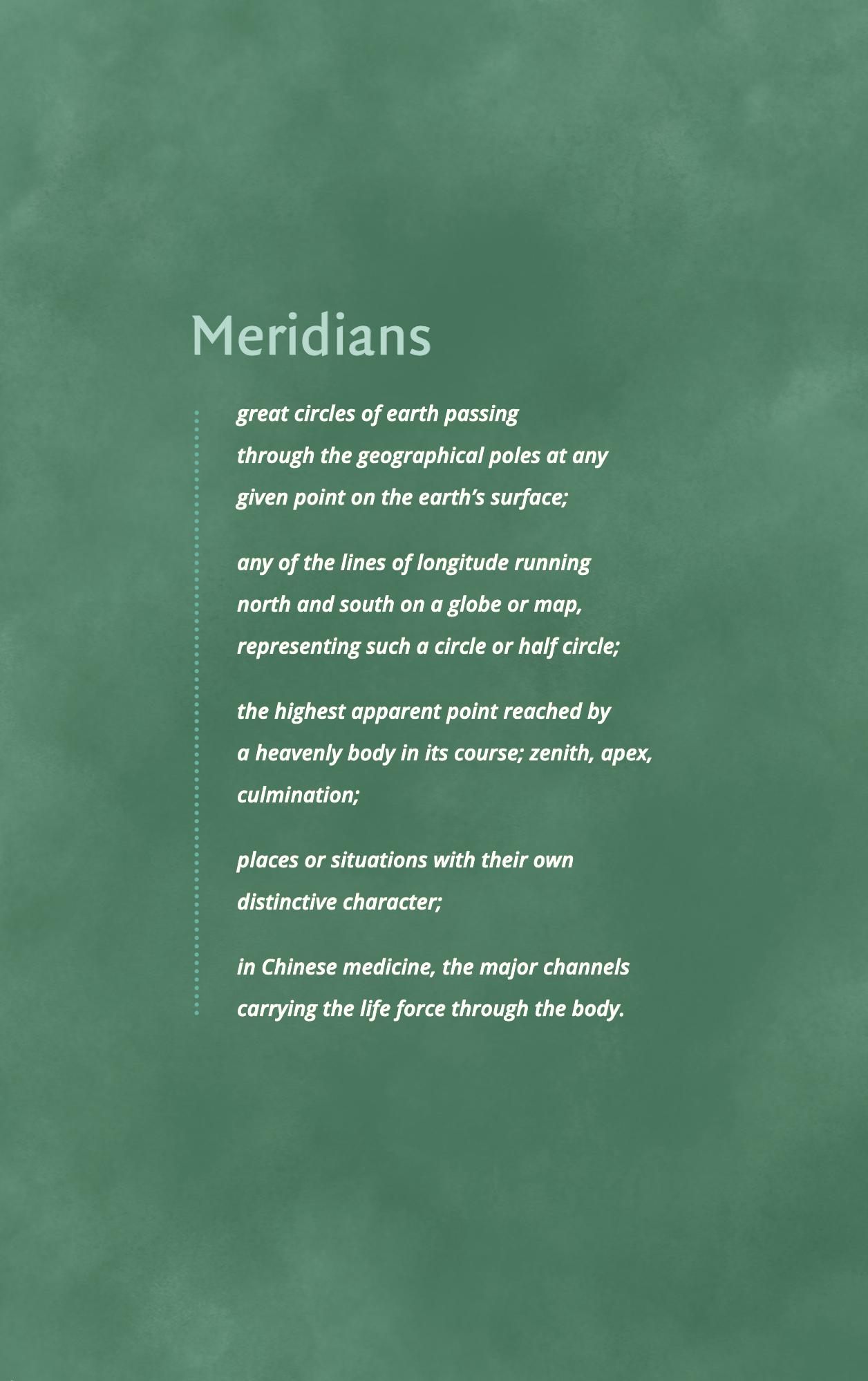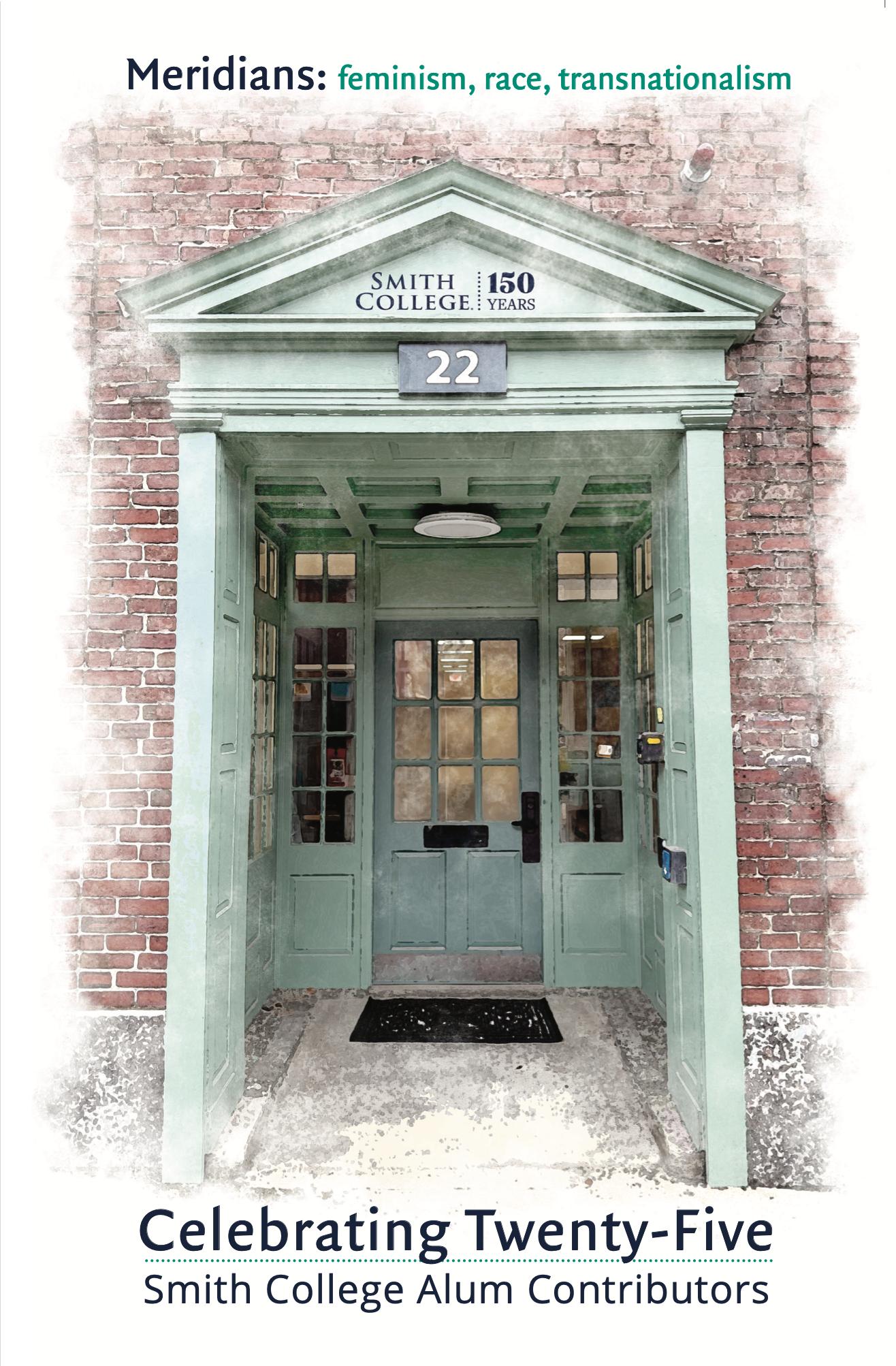
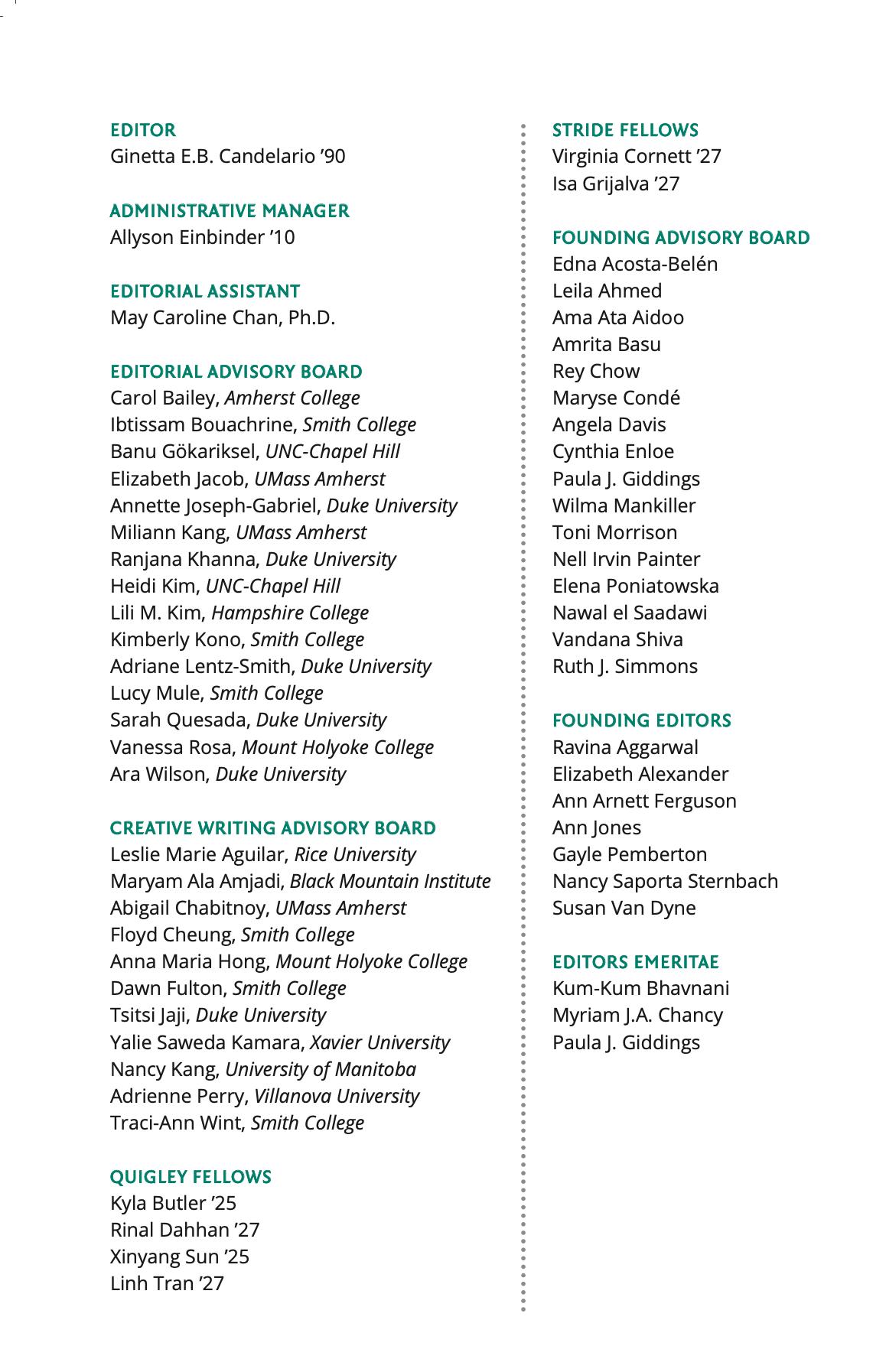
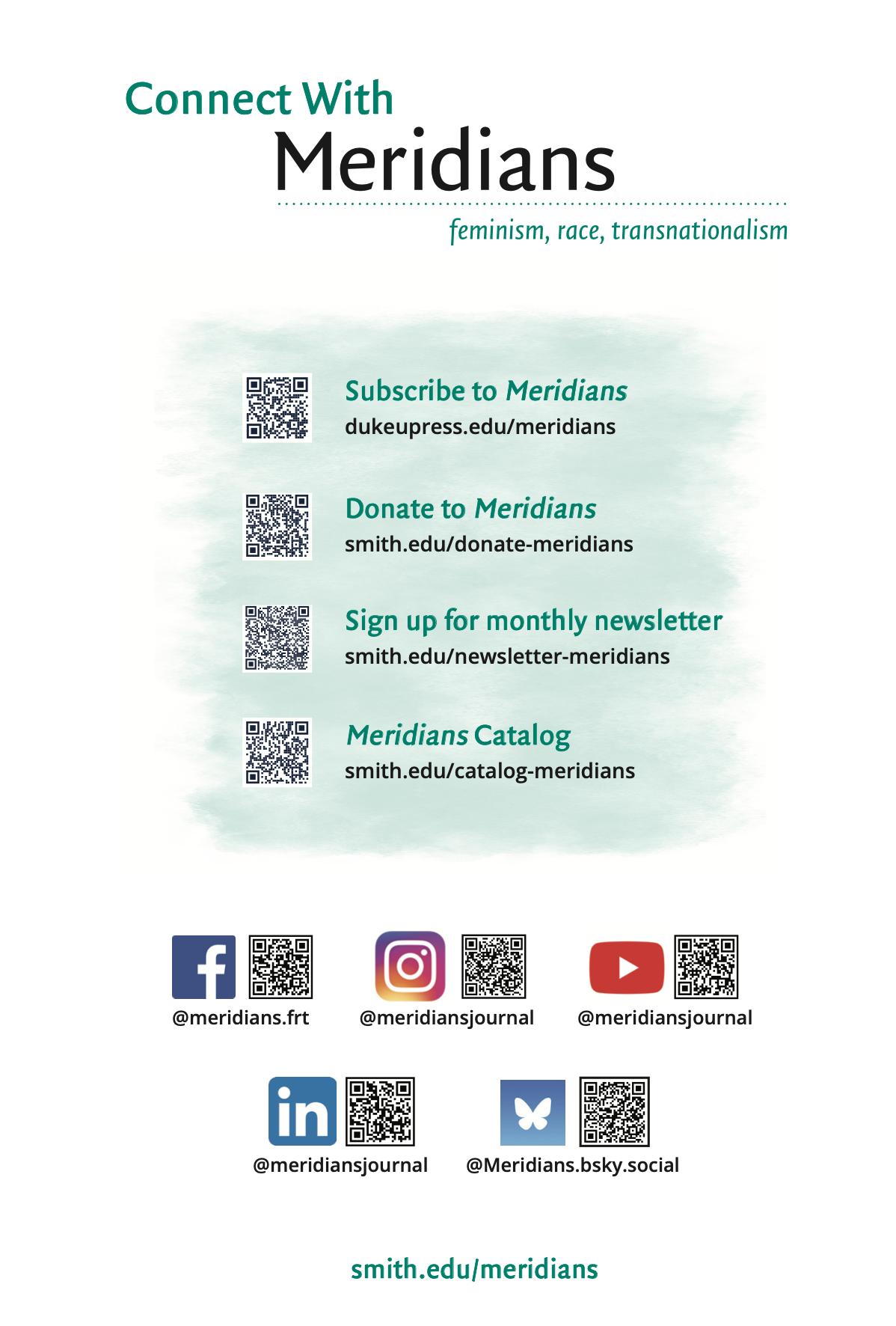




MAY 2025
PRESIDENT’S WELCOME
President Sarah Willie-LeBreton • 2
EDITOR’S INTRODUCTION
Ginetta E.B. Candelario ’90 • 4
ALUM CONTRIBUTORS
Sonia E. Alvarez ’78 • Published in Vol. 1 No. 1 (Fall 2000) • 6
Ginetta E.B. Candelario ’90 • Published in Vol. 1 No. 1 (Fall 2000) • 8
Kathleen Banks Nutter AC ’90 • Published in Vol. 1 No. 1 (Fall 2000) • 10
Jessica Horn ’01 • Published in Vol. 1 No. 2 (Spring 2001) • 12
Odilia Rivera-Santos ’01 • Published in Vol. 2 No. 1 (Fall 2001) • 14
Cassandra Shaylor ’92 • Published in Vol. 2 No. 1 (Fall 2001) • 16
Beth Baltimore ’02 • Published in Vol. 2 No. 2 (Spring 2002) • 18
Nina Ha ’94 • Published in Vol. 3 No. 1 (Fall 2002) • 20
Ranu Samantrai ’84 • Published in Vol. 4 No. 2 (Spring 2004) • 22
Laurie Ann Guerrero AC ’08 • Published in Vol. 9 No. 1 (Spring 2009) • 24
Lenelle Moïse ’04 • Published in Vol. 11 No. 1 (Fall 2011) • 26
Itoro Bassey ’09 • Published in Vol. 12 No. 1 (Spring 2014) • 28
Gloria Steinem ’56 • Published in Vol. 12 No. 1 (Spring 2014) • 30
Ileana Jiménez ’97 • Published in Vol. 15 No. 1 (Spring 2016) • 32
Wambui Mwangi ’90 • Published in Vol. 17 No. 2 (Fall 2018) • 34
Neda Maghbouleh ’04 • Published in Vol. 18 No. 2 (Fall 2019) • 36 des velázquez ’19 • Published in Vol. 18 No. 2 (Fall 2019) • 38
Mandira Venkat ’19 • Published in Vol. 18 No. 2 (Fall 2019) • 40
Emma Schubert ’20 • Published in Vol. 19 No. 1 (Spring 2020) • 42
Callie Swaim-Fox ’21 • Published in Vol. 19 No. 1 (Spring 2020) • 44
Sheilena Downey ’20 • Published in Vol. 19 No. 2 (Fall 2020) • 46
Cece Roth-Eagle ’22 • Published in Vol. 23 No. 1 (Spring 2024) • 48
Umayyah Cable ’05 • Published in Vol. 23 No. 2 (Fall 2024) • 50
Caroline Mar ’05 • Published in Vol. 23 No. 2 (Fall 2024) • 52
Maria-Fátima Santos ’10 • Published in Vol. 24 No. 2 (Fall 2025) • 54
SMITH ALUM AUTHORS BOOKLET ACKNOWLEDGMENTS • 56

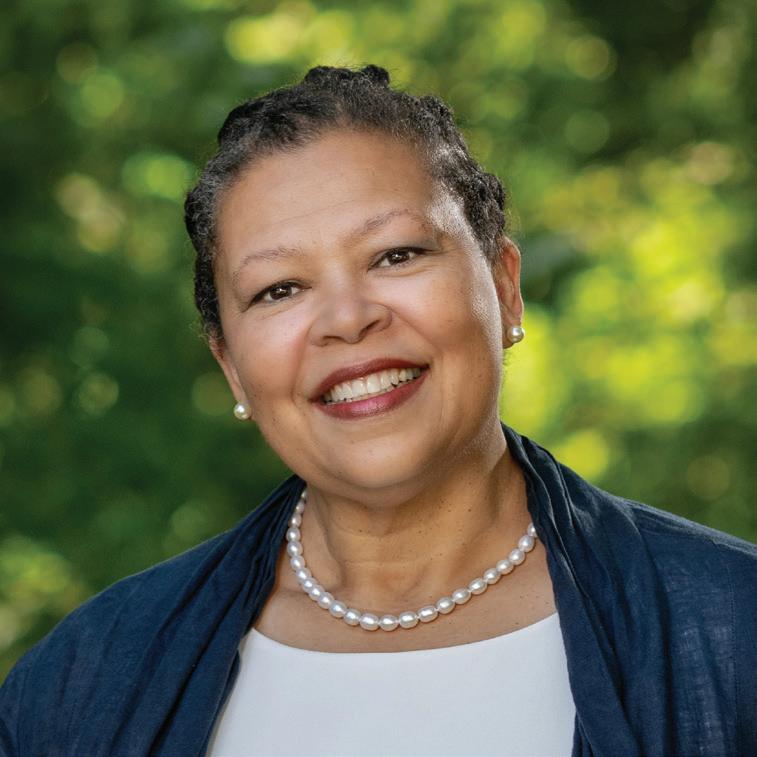
From a nascent idea to a cornerstone of intersectional transnational feminist thought, Meridians has launched, built, and shaped cutting-edge scholarship and creative work for 25 years. Moments like this—to refect on the challenges and savor the successes that come from such deep collaboration—are particularly important. The searing and searching essays and poetry, the evidence-based scholarship, and the radically inclusive vision advanced in the pages of Meridians ofer a trenchant intervention and antidote to the domestic chaos and global upheaval under which so much of the planet’s people live and with which Meridians contributors have always engaged.
For Meridians authors, perhaps particularly those who are also Smith alums, Meridians is more than a journal; it is a space of mutual support, even a home. Reading the
refections, I am struck by the themes of openness, hope, determination, and community.
My wish for you, as you familiarize yourself with this booklet, is that you feel the ferce passion of these authors and the truth of their subjects, and that you gain an appreciation of the global community Meridians has created and sustained. As we gather to celebrate the accomplishments of Meridians, I am both honored and grateful that Smith College is the journal’s home, that alums continue to play essential roles as authors and supporters, and that you are here to help write the next chapters.
Congratulations Meridians, and my very best wishes for the next 25 years!
Sarah Willie-LeBreton President of Smith College
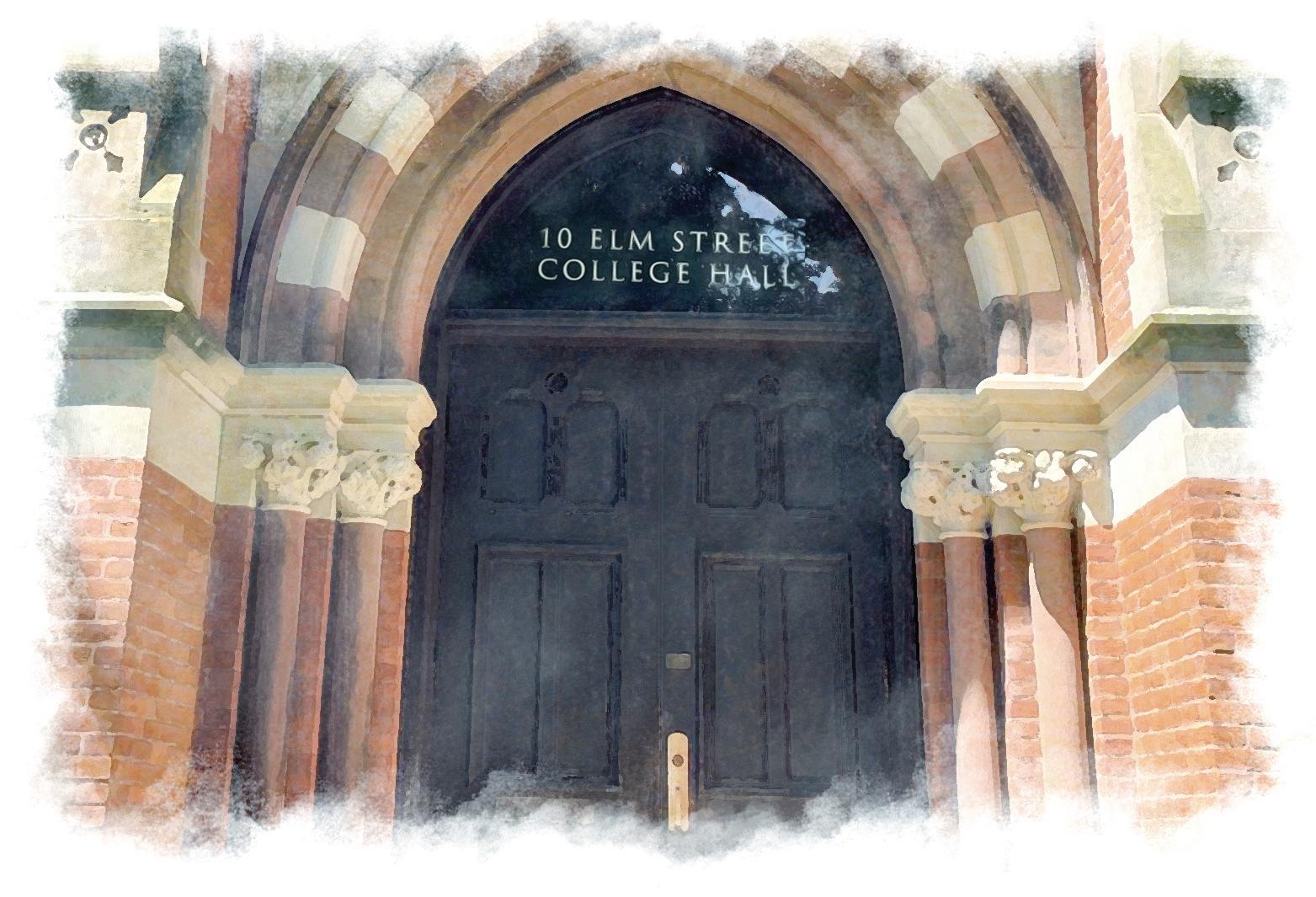

I am thrilled to introduce you to the 251 wonderful Smithies who have contributed their talents to the success of the Meridians: feminism, race, transnationalism project during the journal’s frst 25 years. Meridians was conceived and founded at Smith College in the late 1990s by four visionary faculty members—Elizabeth Alexander (English), Ann Arnett Ferguson (Afro-American Studies), Nancy Saporta Sternbach (Spanish and Latin American & Latina/o Studies), and Susan Van Dyne (Women’s Studies)—with the enthusiastic support of then-President Ruth J. Simmons. Those founders curated the frst issue with the help of an editorial collective that included faculty from both Smith College and Wesleyan University, whose press was the journal’s frst publisher.
Published in the fall of 2000, the frst issue exemplifed the innovative contributions Meridians would go on to make, from including creative writing, activists’ reports, testimonios, and experimental work alongside conventional research-based scholarship. The primary commonality of these features lies in their commitment to showcasing transnational women of color feminist and anti-racist knowledge production in all its glorious, innovative diversity. As President Simmons put it, “Women of color have many histories, and these histories can be brought into full and useful relief by providing opportunities for these women to speak for themselves.” That is what Meridians has done and will continue to do into the future, thanks to the home that Smith College has continued to provide for this work, to the generosity of alumnae donors who funded an endowment to support our work in perpetuity, and to the alum scholars, artists, activists, and achievers who have contributed to the Meridians project’s success.
I hope you will be inspired to read their full pieces, all of which we’ve linked via QR code; peruse the rest of our wonderful catalog; sign up for our newsletter; follow us on social media; and share our work in your networks.
I also invite you to join us—in person or virtually—when we celebrate Meridians: feminism, race, transnationalism with a 25th Anniversary Symposium to be held at Smith College, October 24 to 25, 2025. This two-day event will open with a dinner in honor of our founders, our editors emeritae Kum-Kum Bhavnani and Paula J. Giddings, and our lead champions on campus—President Sarah Willie-LeBreton and Provost and Dean of the Faculty Daphne Lamothe. The second day will be devoted to showcasing the contributions of 17 Meridians activists, artists, poets, and scholars, who will speak about their work and the role Meridians has played in their felds and professional lives.
As this commemorative booklet makes clear, Smithies have much to be proud of in 2025 as we celebrate both the college’s sesquicentennial and Meridians’ 25th anniversary. May these celebrations strengthen our resolve to continue realizing Sophia Smith’s mandate that alumnae use their “infuence in reforming the evils of society,” which strikes me as more important now than ever.
Ginetta E.B. Candelario ’90 Editor, Meridians: feminism, race, transnationalism

1 We were pleased to discover that we have actually published 26 Smith alums, and invited all of them to participate in this commemoration, but one did not respond to our emails so unfortunately they are not included here.
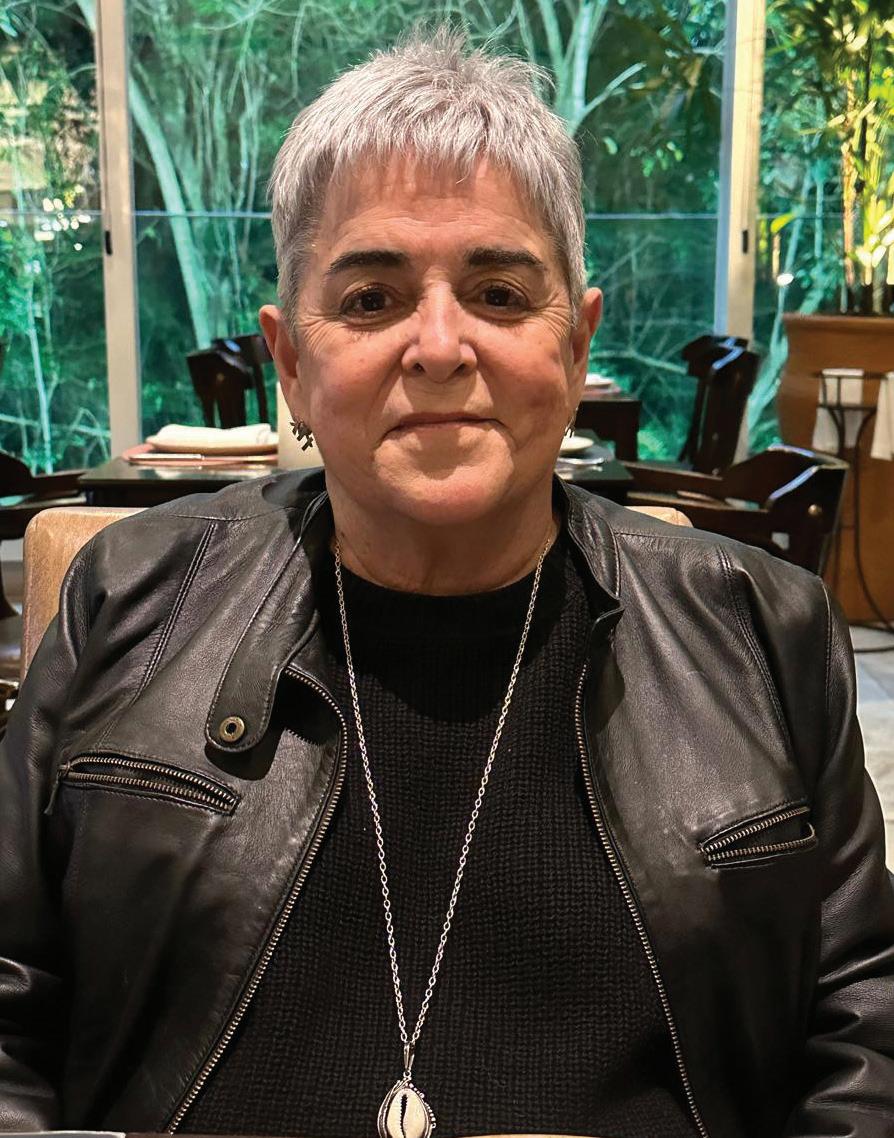

Major:
Government and Latin American Studies
House: Lamont
Job Title: Leonard J. Horwitz
Professor Emerita and Professor Emerita of Political Science
Affiliation: University of Massachusetts Amherst
Location: Amherst, MA
Sonia E. Alvarez is a feminist, antiracist, anti-capitalist intellectualactivist who has been connected with feminisms and a range of other movements in Brazil, Latin America, and the U.S. since the 1980s. Since 2022, she has held the titles of Distinguished Professor Emerita of Political Science and Leonard J. Horwitz Professor Emerita of Latin American Politics and Studies at the University of Massachusetts Amherst. Alvarez is the author or co-editor of eight books and several special journal issues, and has published over 120 essays and book chapters—many written collaboratively—in Portuguese, Spanish, and English. She writes on topics including movements, feminist politics, NGOs, civil society, race and racism, transnational activism, protest, and democratization. Alvarez is a former President of the Latin American Studies Association and Director of the Center for Latin American, Caribbean, and Latino Studies at University of Massachusetts Amherst. She has co-coordinated the Colectiva Protesta since the early 2010s.
“In some contexts, local activists’ engagement in exchanges driven by an IGO-advocacy logic also
“Translating
Published in Vol. 1 No. 1 (Fall 2000)

spurred the geographical, intranational decentering of feminism—that is, its difusion beyond an original, usually small, ‘hegemonic core’ of activists, organizations, and issues (Stein 1995). The sanctioning and even encouragement of ‘civil society participation’ in UN conference processes by local, national, and international public authorities confers ‘ofcial’ legitimacy on related movement activities—providing an additional top-down incentive for participation by activists who might not otherwise have been involved, and sometimes granting participants increased access to local and national policy microphones” (46).
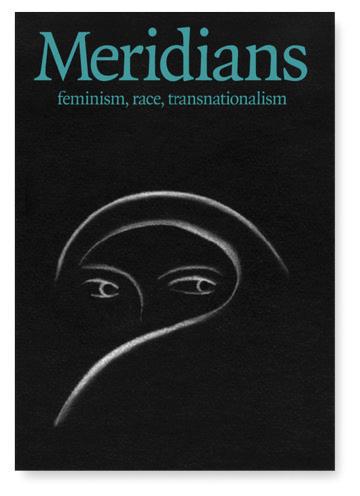


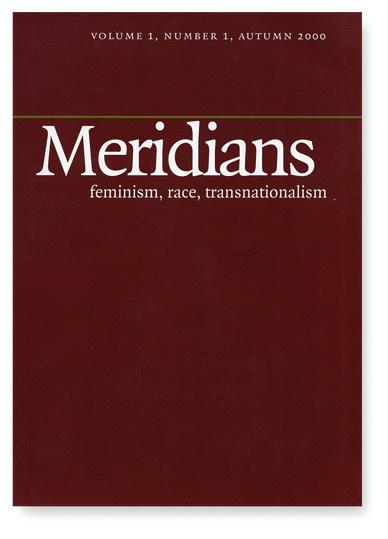



Our essay and photos about the frst Black Women’s March in Brazil in 2015 were part of my continued efort to transnationalize and translate diverse feminisms in the Americas. A second national march is scheduled to take place in Brasília in November 2025 and is expected to draw over 1 million Black women and allies.

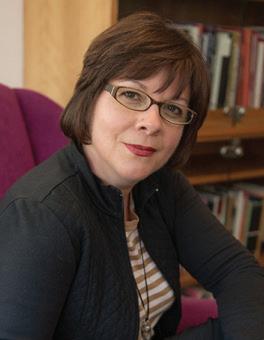

Major: Economics
Minor: Public Policy
Houses: Parsons, Sessions, Friedman A3
Job Title: Professor of Sociology and Latin American & Latina/o Studies, and Editor of Meridians: feminism, race, transnationalism
Affiliation: Smith College
Location: Northampton, MA
I am a Professor of Sociology and Latin American & Latina/o Studies at Smith College, where I joined the faculty in 1999 after a Mendenhall Fellowship Year (1998–1999). My work focuses on questions of race and racial identity, particularly in terms of Blackness in the Americas, as well as on feminism, women’s movements, and Hispanic Caribbean communities in the United States, with a particular focus on Dominicans at home and in diaspora. My Dominican mother’s motto—“saber es poder/knowledge is power”—has inspired my life’s work as a transnational feminist educator, scholar, and activist. I have had the honor of directing the Meridians project since 2017.
“The explicit work of the salon, the transformation of a Dominican woman’s hair into a culturally acceptable sign of beauty, hinges the customer’s sense of self and beauty on certain racialized norms and models. The Dominican salon acts as a socializing agent. Hair care and salon use are rites of passage into Dominican women’s community. At the salon, girls and women learn to transform their bodies—through hair care, waxing,
Published in Vol. 1 No. 1 (Fall 2000)

manicuring, pedicuring, facials, and so forth—into socially valued, culturally specifc, and race-determining displays of femininity” (135).
My essay, “Hair Race-ing: Dominican Beauty Culture and Identity Production,” was published in the frst issue of Meridians in the fall of 2000. My participation was encouraged by the founding editorial collective who invited me to submit a chapter from my dissertation project, which I was working on in 1998 while I was a Mendenhall Doctoral Dissertation Fellow at Smith College. I was thrilled that “Hair Race-ing” was accepted for publication, and honored to become part of the Meridians Editorial Advisory Board when I joined the faculty at Smith in 1999. Despite working with Meridians in various capacities over the next decade and a half, I was completely surprised when I was asked to step into the role of editor after Paula Giddings retired in 2016. With Paula’s encouragement and support, I accepted the ofer and became the journal’s fourth editor in July of 2017. It has been an incredibly enriching experience in every way.






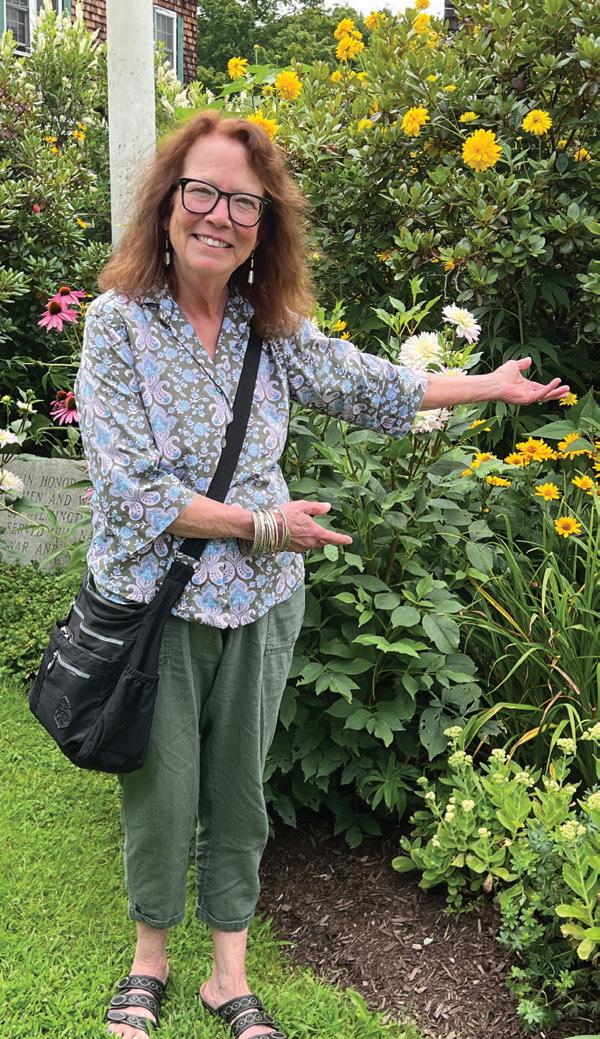
Photo by Patricia Reeve

After taking “early” retirement from Smith College in 2019, I have continued to work on multiple projects of interest, including as a research afliate through the Study of Women, Gender, and Sexuality Department (SWGS) working on the Reproductive Justice History in Action Project. I have also been working on an article titled “’Welfare Mother to Run for Governor’: The 1990 Campaign of Dottie Stevens.”
Major: History
Job Title: Research Afliate, Study of Women, Gender, and Sexuality
Affiliation: Smith College
Location: Northampton, MA
“The papers of Constance Baker Motley, the frst African American woman elected to the New York State Senate and the frst appointed to a federal judgeship, document more than a life of extraordinary achievement. Motley’s papers also provide ample, and at times, dramatic evidence of the prolonged struggle for racial equality in postWorld War II America. That this one woman of color chose to engage in that struggle through the legal system gives a particular slant to these papers” (204).
“The

Published in Vol. 1 No. 1 (Fall 2000)
“Potential topics of research within the Motley Papers include discrimination and racism in the U.S. and the eforts to combat both through the civil rights movement; afrmative action for African Americans and women, urban renewal in New York City in the 1960s, and women in politics, in the legal profession, and in the judiciary” (206).






During my long association with the Sophia Smith Collection (SSC), frst as a student worker while an Ada Comstock Scholar (1988–1990) and then as an archivist (1996–2003 and 2011–2019), I had the great privilege to be a part of the Voices of Feminism Oral History Project, interviewing several women involved in the labor movement during the 1970s onward, as well as the opportunity to work with countless student researchers, from grade school through graduate school, interested in the holdings of the SSC. I was honored to contribute a piece highlighting one of its excellent collections: the papers of trailblazer Constance Baker Motley.
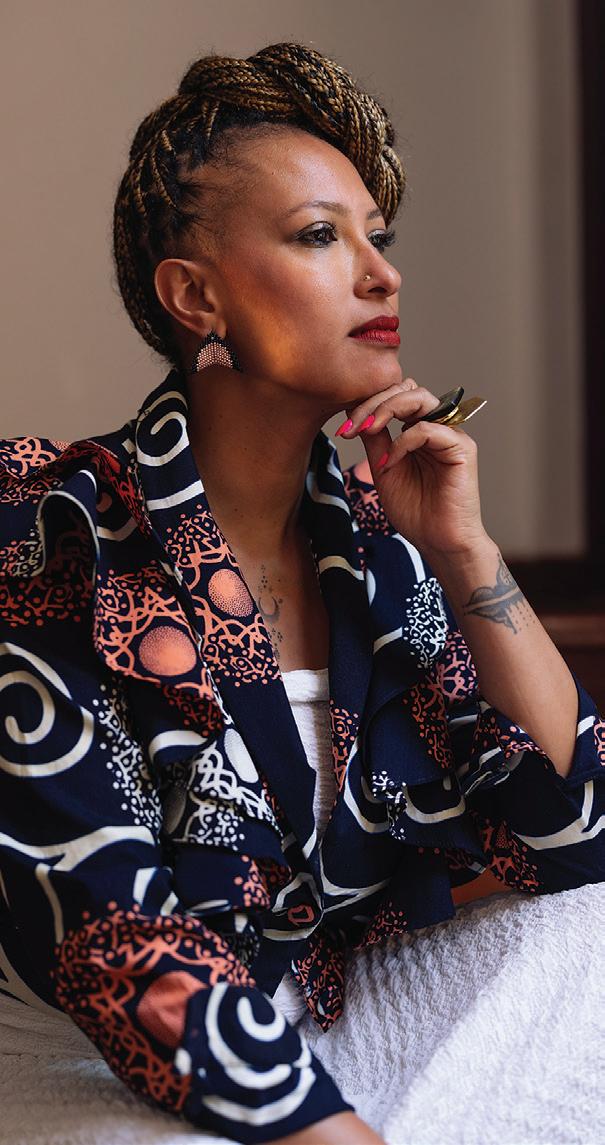

Major: Anthropology
House: Friedman
Job Title: Senior Research Fellow
Affiliation: Moleskine Foundation
Location: Nairobi, Kenya
Jessica Horn is an East African feminist writer, practitioner, and ‘what next’ thinker. Grounded in feminist activist work around body politics, she entered philanthropy at a time when there were comparatively few African women/Black women in the feld. At the African Women’s Development Fund—Africa’s frst feminist fund— she pioneered the Futures initiative, and led programming through a multimillion budget growth. Jessica became the frst African woman to lead the Ford Foundation’s East Africa ofce. Dedicated to amplifying women’s agency, she co-founded Our Africa—a platform profling African women’s analysis on openDemocracy. Jessica was named African Woman Changemaker by ARISE Magazine and one of Applause Africa’s 40 most infuential Africans under 40. She served as Commissioner on the Lancet Commission on Gender and Global Health and is a founding member of the African Feminist Forum. She is the author of African Feminist Praxis: Cartographies of Liberatory Worldmaking.
“Toni Cade Bambara once said, ‘Writing is the way I participate in the struggle.’ I have tried to participate
Published in Vol. 1 No. 2 (Spring 2001)

in the struggle with my writing and also with other community activities. However, in whatever other ways I serve, writing will always be my frst response. For example, if I see an injustice being done, my frst reaction is, ‘Maybe I can write about it.’ It’s an immediate refex for me. Can we change things by writing about them? I am not sure. But it’s always my frst reaction” (23).


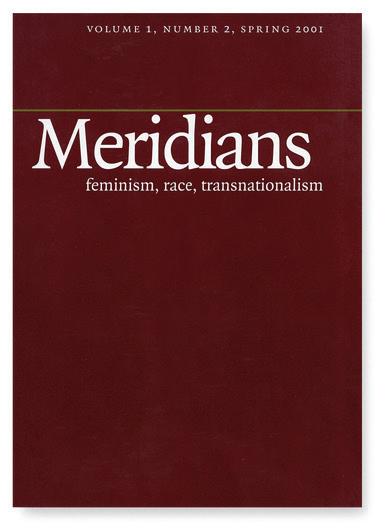



I worked at Meridians as a student intern in its inaugural years and helped organize the frst Meridians conference, which was like a gathering of a lineage of inspiration! It was a journal, but it was also a political ground for feminists of color to nurture a new space for thought and analysis. I had the privilege of interviewing Edwidge Danticat for Meridians. I say privilege because, as a high school student, Danticat’s novels ofered me a frst in-depth understanding of Haiti’s history, told beautifully and painfully through the lives of women. When we read, we often form a deep sense of kinship with the writing, but interviewing her allowed me to consider a kinship in purpose. It was also my frst experience of contributing to the documentation of Black women thinkers and their voices, a practice I have continued to grow in my own activist and professional work, documenting the biographies and praxis of African feminists.

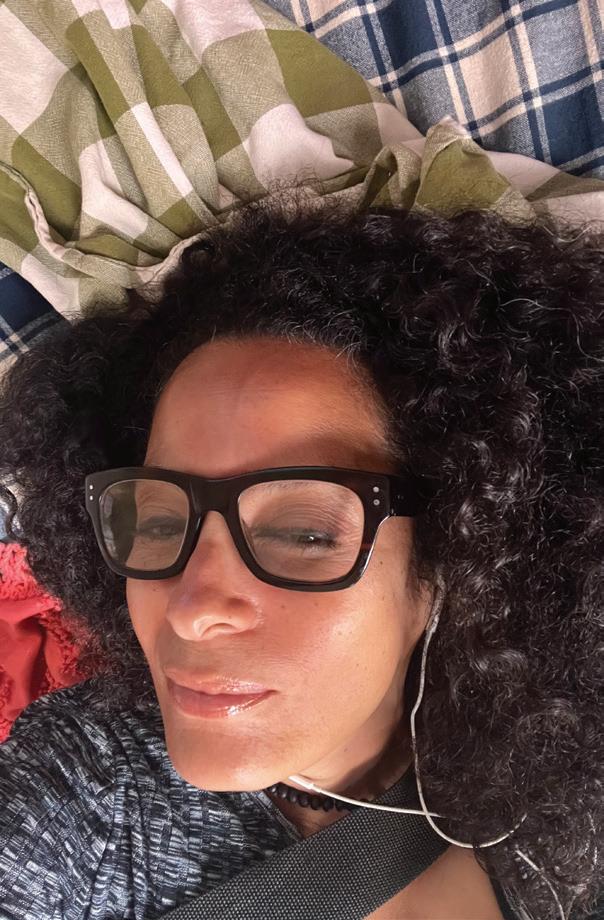

Odilia Rivera-Santos, MAPP is a Puerto Rican author whose fction, nonfction, poetry, and interviews have appeared in print and online journals.
She holds a BA in Comparative Literature and Writing from Smith College and an MA in Positive Psychology from the University of Pennsylvania. Ms. Rivera-Santos is a certifed career and personal coach and writer.
Major: Comparative Literature
Minor: Writing CURRENT INFO
Job Title: Personal Coach and Writer
Location: New York, NY
At Smith, I received tremendous encouragement with my writing, especially from Professor Annie Boutelle. I decided to write about issues of gender, culture, family, and the conficting relationships we can have with all of them. It was exhilarating to have my work accepted for publication in such a beautifully created journal. It was defnitely a high point in my writing life and my time at Smith.


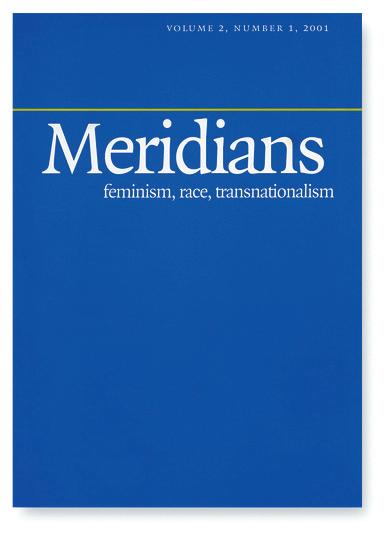



Published in Vol. 2 No. 1 (Fall 2001)

The porch is white a dark-skinned man wears a white suit
I sneak into his backyard to eat yellow fowers; orange is not my color at fve years old, the smell of green cigars drew me to his garden and the grandfather clock chimes; I hear it Everywhere.
Blond cinnamon-skinned boys walk by we wait on the porch for the mangos to ripen with red spots.

“Mami Haikus”
Published in Vol. 2 No. 1 (Fall 2001)
Wields a machete eyes afre with unlived dreams her song is still sweet
Ella quería Ella no pudo tener Su propio fuego
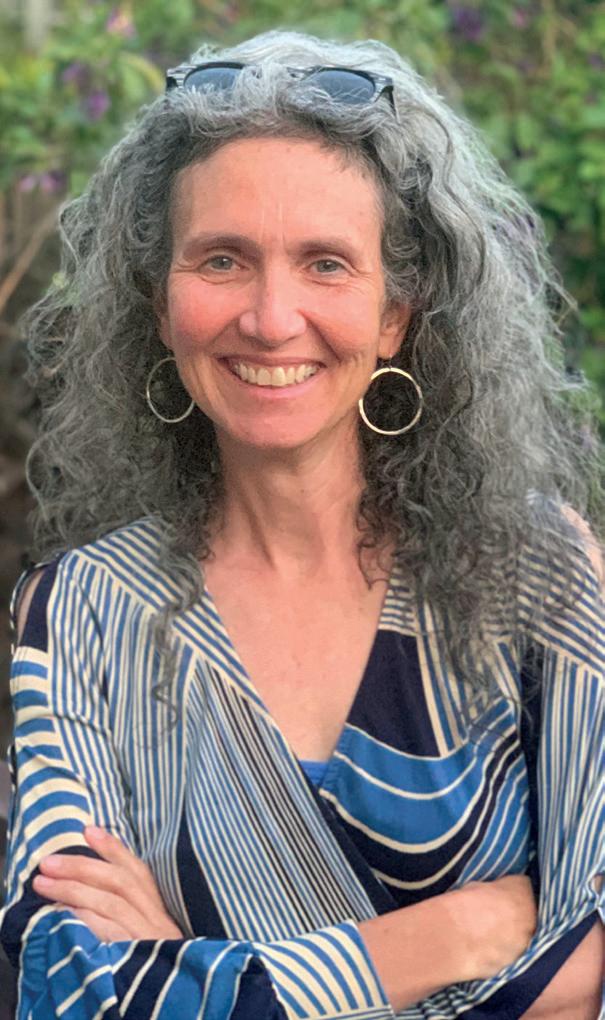

Major: English
House: King CURRENT INFO
Job Title:
Activist, Attorney, and Artist
Affiliation: East Bay
Meditation Center
Location: Oakland, CA
Cassandra Shaylor is an activist, attorney, and artist based in Oakland, California. She is the co-founder and former co-director of Justice Now and a co-founder of Critical Resistance, both abolitionist organizations focused on building a world free of carcerality in all its forms. Her academic and written work has centered on issues of women in prison, abolition, and the intersections of race, sexuality, gender, and punishment. She is currently the Development Director at the East Bay Meditation Center—a justicefocused organization that centers BIPOC, LGBTQIA+ folks, people living with disabilities, and other historically marginalized people—where she ofers mindfulness meditation training and radically inclusive community building. Over the past few years, she has focused on nonproft fundraising and development, as well as spending time with her ferce, feminist 12-yearold daughter.
“There is an ironic but telling similarity between the economic impact of the prison industrial complex and that of the military industrial complex, with which it shares important structural features. Both systems simultaneously produce vast profts
Published in Vol. 2 No. 1 (Fall 2001)

and social destruction. What is benefcial to the corporations, politicians, and state entities involved in these systems brings blight and death to poor and racially marginalized communities throughout the world. In the case of the prison industrial complex, the transformation of imprisoned bodies of color into consumers and/or producers of an immense range of commodities efectively transforms public funds into proft, leaving little in the way of social assistance to bolster the eforts of women and men who want to overcome barriers erected by poverty and racism” (3).






Now that we are in a period when the concept of abolition in relation to prisons and policing is broadly accepted and critiques of the carceral state are ubiquitous, it may be hard to believe that only 25 years ago, when the piece I co-wrote and published in Meridians, that was not at all the case. Conditions inside prisons, particularly for those languishing in prisons for women, were largely invisible, and the intersections of race, gender, and imprisonment were inadequately analyzed. My mentor and comrade Angela Davis and I wrote an essay about these issues for the UN World Conference Against Racism which was held in Durban, South Africa, in 2001, to highlight the connections between human rights and women’s rights, and to raise awareness about the global implications of what was happening in women’s prisons in the United States. We were approached by then-editor Kum-Kum Bhavnani in the early days of Meridians about editing and reprinting the piece, which gave it a new audience, a broader reach, and a much longer life, for which we are immensely grateful. The fact that the essay is still in circulation, used as a tool by those seeking to learn about and challenge the prison industrial complex in order to imagine and build abolitionist futures, is a testament to the important work Meridians has done and continues to do in the world.
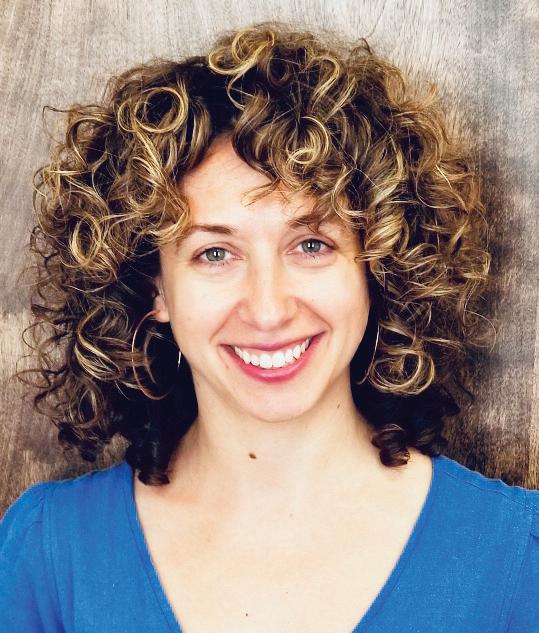

Major: Women’s Studies
Minor: Spanish House: Baldwin
Job Title: Director of Pro Bono and Civil Legal Initiatives
Affiliation: The Door, Legal Services Center
Location: New York, NY
Beth Baltimore is the Director of Pro Bono and Civil Legal Initiatives at The Door’s Legal Services Center, where she oversees the ofce’s work representing unhoused immigrant youth. She was previously the Legal Manager/ Immigration Specialist at Justice in Motion (JiM), where she worked with human rights defenders from Mexico and Central America and participated in the Steering Committee for Ms. L v. ICE. Prior to JiM, Beth spent over a decade as a Senior Staf Attorney and Immigration Specialist at Legal Services NYC where she provided holistic civil legal services to low-income New Yorkers. Her practice focused on working with LGBTQ and HIV-afected people and survivors of violence. Beth is a graduate of Smith College and Brooklyn Law School, and was also a Fellow with the Shriver Center’s Racial Justice Institute. She was one of the frst recipients of Public Service Loan Forgiveness, a program threatened by the Trump administration.
“In the name of progress, pluralism, tolerance, and liberty, you do not leave any option for those of us who do beneft from having the good fortune of liberty and the fruits of civilization that you want to defend for your nation, and those of us who never sided with terrorism since we were its victims. There are no options for us who are proud expressions of other civilizations, who live day by day with the hope
“Rigoberta
Published in Vol. 2 No. 2

of converting discrimination and pillaging to achieving recognition and respect, who carry in our souls the painful genocide perpetrated against our peoples, us who, in short, are tired of providing the victims for other nations’ wars. We cannot share the arrogance of your infallibility nor the single path down which you wish to push us when you afrm that ‘All nations in all regions should make a decision now: either you are with us or with the terrorists’” (276–77; excerpt from a letter by Rigoberta Menchú, translated from Spanish by Beth Baltimore ’02).
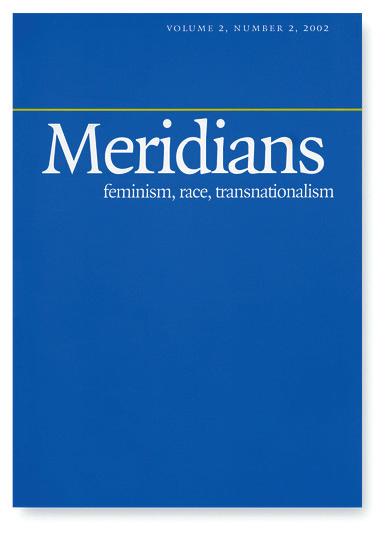





Rereading Rigoberta Menchú’s letter to George W. Bush and my translation, along with the essays and statements in “September 11: A Feminist Archive” brings me back to the fall of 2001, my senior year at Smith, and the deep impact 9/11 had on so many of our lives that year. I vividly remember leaving class early and sitting with other New Yorkers in Baldwin House trying to reach our families that day. I recall going home for fall break a few weeks later and protesting the U.S. invasion in Afghanistan as well as the rampant public anti-Muslim rhetoric and attacks across the country. Some of my classes changed their focus that semester to respond to 9/11 with a feminist lens and critique of war. The last few years have made me think about 2001 and the ongoing harm that persists from the U.S. invasion in Afghanistan. In 2021, the chaotic withdrawal of the U.S. military from Afghanistan led to the separation of hundreds of Afghan children from their parents at the Kabul airport. I worked with many unaccompanied Afghan children in immigration detention and supported the reunifcation eforts with their parents, which was unnecessarily difcult because of U.S. government action, or in-action. Watching the U.S.-supported and funded war on Gaza and deaths of over 45,000 Palestinians over the last 17 months is another reminder that we must continue to resist the U.S. government’s racist and xenophobic policies in our own spheres and work in solidarity with those impacted.
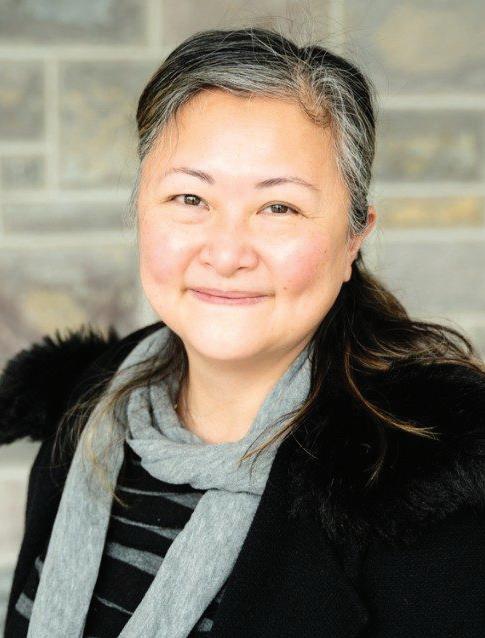

Major: English
Minor: Government
House: Tyler CURRENT INFO
Job Title:
Director of the APIDA+ Center, and Afliate
Faculty in Sociology
Affiliation: Virginia Tech
Location: Blacksburg, VA
Nina Ha is the Director of the Beyond Boundaries Collaborative District, overseeing the APIDA+ (Asian Pacifc Islander Desi American) Center and afliated faculty in Sociology at Virginia Tech. She has a PhD in English from the University of Massachusetts Amherst, an MA in Asian American Studies from the University of California, Los Angeles, and a BA in English from Smith College. Her academic expertise is in Vietnamese and diasporic literature, Asian American Studies, Ethnic American Studies, Women’s and Gender Studies, and Global/ Transnational Studies. Through her initiative, the US Department of Education designated Virginia Tech as an Asian American Native American Pacifc Islander Serving Institution, AANAPISI, which is a frst for an institution in Southwest Virginia.
“My family’s trajectory of migration and settlement has made me think in more complicated ways about the history of migration for Asian Americans, about how what happens ‘over there’ in Asia produces narratives of migration and displacement ‘over here’ in the Americas. For many Asian American communities, the trajectory of
Published in Vol. 3 No. 1 (Fall 2002)

migration is not a straight shot from a country of origin in Asia to the U.S., but rather a series of multiple migrations—for example, from India to Uganda to Great Britain to Canada—an instance which points to the need for more emphasis on dialectical understandings of empire and immigration. Those very sites which may be thought of as ‘postcolonial’ also may be thought of as sites in which decolonization in many ways has failed—it is this failure of decolonization that often produces, either by political force or for economic reasons, migratory displacements to places like the UK or North America” (203).


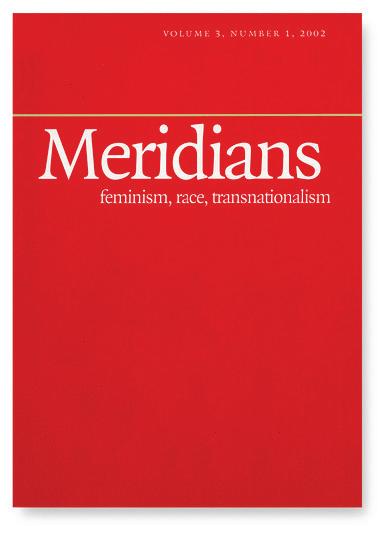



Because my published piece was an interview, to this day I encourage the production of oral histories as a way to record the contributions of Asian Pacifc Islander Desi Americans (APIDAs), especially since there has been a history of erasing, obscuring, or disregarding what APIDAs have accomplished not only in the U.S. but also the diaspora. Through my work as a teacher, scholar, and social justice advocate, I recognize the importance of laying claim to and publishing the experiences of APIDAs so that they cannot get lost. Thus, the opportunity to contribute to Meridians was such a unique privilege.
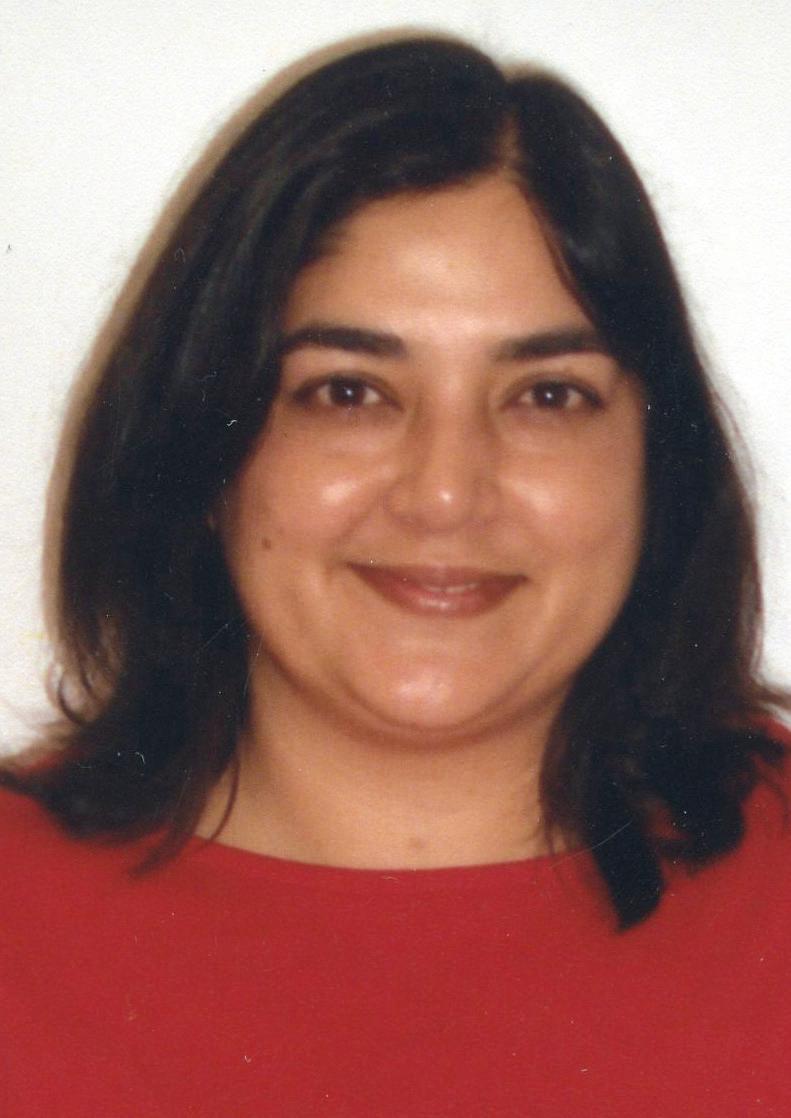

SMITH INFO
Major: English House: Tyler
CURRENT INFO
Job Title: Retired Associate Professor in English
Affiliation:
Indiana University
Location: Bloomington, IN
I recently retired from a career as Professor of English that began at Smith College and ended at Indiana University. I am the author of AlterNatives: Black Feminism in the Post-Imperial Nation (2002), numerous articles on diasporic and Black and Asian British literatures, and co-editor of Interdisciplinarity and Social Justice (2010). Though centered primarily on England, my research traces broad processes of uneven decolonization with publications on the evolution of the national legal framework, the rise of diasporic cultures, conficts regarding gender norms, and attendant shifts in expressive cultural practices.
“The trajectory of infuences Zarina traces is far more intricate than the notion of separate cultural and aesthetic traditions that mix into new syncretic forms. She suggests that by engaging critically with one tradition and proceeding through it, we can reach another. Each tradition is already hybridized, and each one opens into others. By inhabiting one tradition deeply we discover an avenue of entry into others” (175).
“To draw blueprints would be to portray the past as fully available to
Published in Vol. 4 No. 2 (Spring 2004)

the present. But Zarina’s prints are not about retrieval, preservation or return. Still less are they about stripping away fux and change to create artifacts for the heritage industry. The home she recalls is irretrievably foreign and distant, but nonetheless exerts its infuence in the here and now. Her work is a commentary on memory and tenacity, and is often prompted by loss” (181).





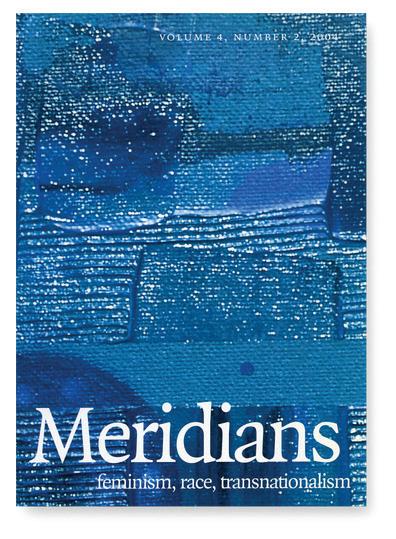
This work signals a shift from my early, highly analytical writing to the more exploratory, fgurative work to which I turned post-tenure. My previous work had always been interdisciplinary, and in that way experimental, so my subsequent work never lost footing in research-based analysis. Nevertheless, the accomplishment of tenure gave me permission to acknowledge the personal, to examine expressive forms in which I was not an expert, and to prioritize the aesthetics of language in my own writing. Zarina Hashmi, the subject of this interview-essay, bridged a life in the East with a life in the West, leading to work embodying the aesthetics and histories of both locales. Through her, I, too, was able to bridge the personal and professional, with the happy result that my work gained in authenticity and integrity. It would have been challenging to place this pivotal piece of writing anywhere other than with Meridians; the journal is unusual in its embrace of the full spectrum of analytical and expressive cultural production. I’m honored to have participated in its mission by virtue of my involvement in the journal’s founding, my service as a member of its board, and again as one of its authors.
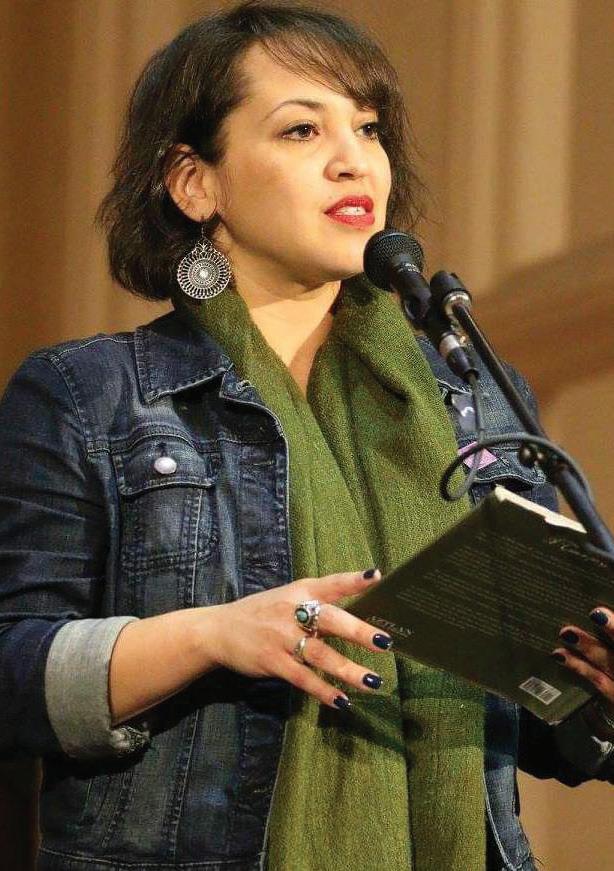

INFO
Major: English Language & Literature, Sophia Smith Scholar in Poetry House: Of campus
CURRENT INFO
Job Title: Associate Professor and Writer-in-Residence
Affiliation: Department of Language, Literature and Arts, Texas A&M University
Location: San Antonio, TX
Laurie Ann Guerrero, born and raised in the Southside of San Antonio, is the author of four collections: Babies under the Skin (Panhandler 2007), A Tongue in the Mouth of the Dying (Notre Dame 2013), A Crown for Gumecindo (Aztlan Libre 2015), and I Have Eaten the Rattlesnake: New & Selected (TCU 2021). She is the former Poet Laureate of the city of San Antonio (2014–2016) and the state of Texas (2016–2017). She is an Associate Professor and the Writerin-Residence at Texas A&M UniversitySan Antonio.
The poem I published in Meridians, “How I Put Myself through School,” was a poem I wrote while I was an Ada Comstock Scholar at Smith. At the time, I had three small children and did various cleaning jobs to make ends meet. To have that poem published in Meridians while I was still a student at Smith was incredibly empowering to me. I was working hard to take care of my children, to write two creative manuscripts as a Sophia Smith Scholar, and to do the coursework for my English degree (technically a double major). The support and encouragement I got from my professors was vital, but this publication—at that time—in which I detailed the shame around race
Published in Vol. 9 No. 1 (Spring 2009)

There is a label specifcally for organic meats and caviar on the refrigerator shelf of the woman whose house I clean. Another on a rack for the well-traveled chardonnays and sauvignons, below the crystal champagne futes, reminding me what goes where. I systematize her cupboards and nail-clipping-infested junk drawer, while her children, the underweight, disobedient darlings, stare as I reshelve their dolls and brand-new books. Stare as their mother stares. Stare as I pour the ajo y cebolla of my blood into a pot of rice that will end up in the trash because of its spice. Stare as I shake the wrinkles out of faded cotton panties and boxer shorts— the lingering heat of the dryer taking me to a bedroom I never wanted to be in. Sweat beading at the bridge of my nose, I accept the clothes she collects in trash bags for my daughters who are younger but much bigger, knowing they will never ft, and wonder, if she could, would she pierce the skin of my gut, scrape the eggs from my womb, spread them like a good Beluga, eliminating me and any other chance at adding to the fery Chicanitas who ask, Why do you take her used things, Mama (30)?
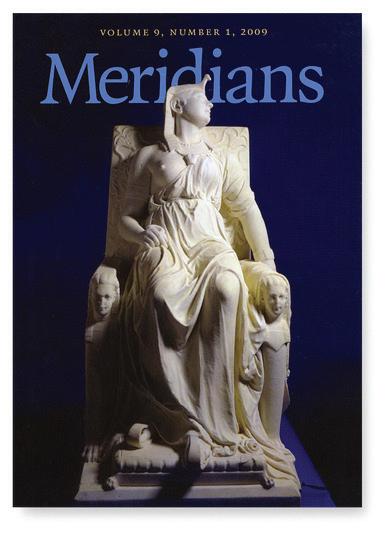
and class issues, gave me the courage I needed to keep working toward my goals. The publication at Meridians made me feel seen—there, at Smith. The writing process has always been a way to work out my truths and to hold a mirror to myself. I read this poem now, nearly 20 years after I wrote it, and I think of the women in my family who did jobs like this to keep their families fed. I was so ashamed then, but it was an honor, I see now, to be able to do that work. It was an honor that while I did it to keep my own babies fed, I was also writing and getting a Smith College education.






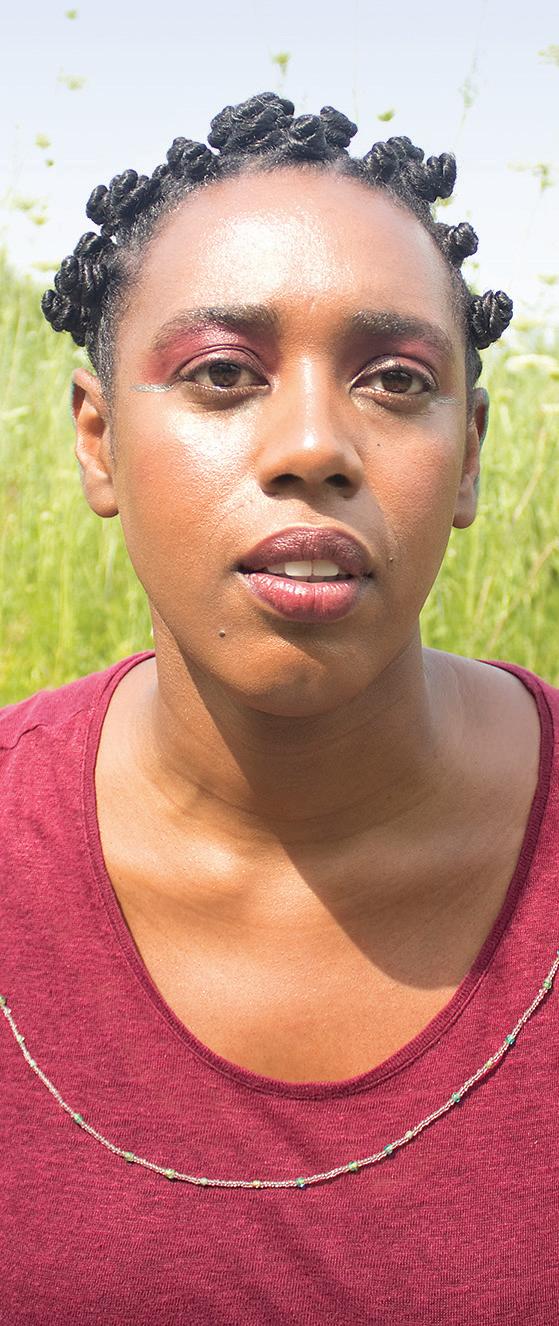
Photo by Vanessa Vargas
Lenelle Moïse is a writer and theater artist, born in the Caribbean and raised in Massachusetts. Her play K-I-S-S-I-N-G was a winner of the 2023 Elliot Norton Award for Outstanding New Script, an international fnalist for the 2024 Susan Smith Blackburn Prize, and a citation recipient for the 2024 Steinberg/ATCA New Play Award. Fueled by radical optimism, Lenelle’s artistic infuences include bebop, hip-hop, nature-based spirituality, queer liberation, and memory. She wrote, composed, and co-starred in the of-Broadway show Expatriate. Her play Merit won The Ruby Prize and was featured on The Kilroys List after workshops at Hedgebrook, the Huntington Theatre, and the New Black Fest at the Lark. Her writing appears in many anthologies, including Word Warriors: 35 Women Leaders in the Spoken Word Revolution. Lenelle’s collection of poetry, Haiti Glass, was a PEN Oakland Josephine Miles Award winner. She earned an MFA in Playwriting from Smith College.

SMITH INFO
Major: MFA in Playwriting CURRENT INFO
Job Title: Poet, Playwright, Screenwriter
Location: Northampton, MA
“because john doe is not a haitian name”
Published in Vol. 11 No. 1 (Fall 2011)

a rotting smell where the school once stood a hungry shrill where the guava tree grew last night before the earth ate port-au-prince a bleeding orphan was somebody’s baby & that somebody was pretty or plain & that somebody was saucy or shrinking & that somebody made love, made mistakes & that somebody ate mosquitoes, chewed cane & léogâne served the lwa, praised the lord & jacmel danced well, clapped instead & carrefour had a temper, had a gift & that somebody atop a mass grave
knew marie, dieudonne, tantee knew yves-pierre, jean-jean, timarc who will christen those who named us with intention? a poet also died in the earthquake (106-7).





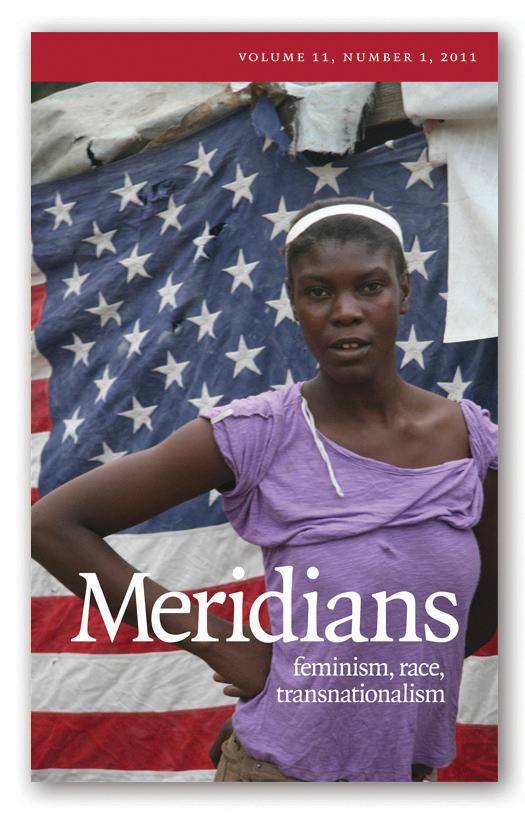

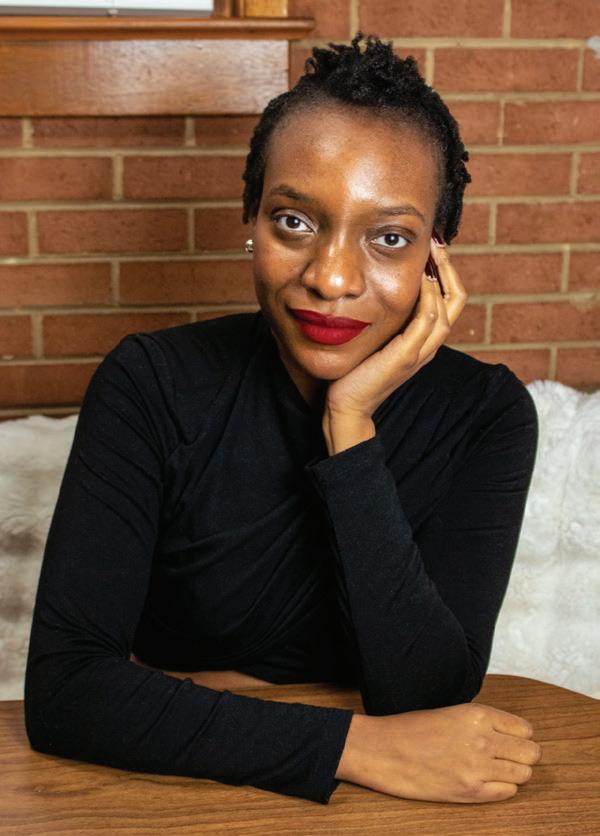
Photo by Nakiya Nash-Prince

SMITH INFO
Major:
African American Studies
Minor: Theatre House: Cushing
CURRENT INFO
Job Title: Journalist and Producer
Affiliation: British Broadcasting Corporation (BBC)
Location: Washington, D.C.
Itoro Bassey is a Nigerian American author whose work explores migration, identity, gender, and belonging, centering the experiences of Nigerian and Nigerian American women. She has been published in numerous literary journals, including NELLE and Fence, and has a forthcoming story in Callaloo. Her short fction has been nominated for a Pushcart Prize and recognized by International Literary Seminars.
Her debut short story collection, Ajebutter Women, won the W.S. Porter Prize and will be published by Regal House Publishing in 2027. She has received awards and fellowships from the Johannesburg Institute for Advanced Study, International Literary Seminars, and the Edward Albee Foundation. She also serves as a board member for The Inner Loop, a literary organization supporting emerging writers in the D.C. area.
In addition to her literary work, Itoro reports on major global news stories for the BBC as a producer.
“Mama decided to remember the woman’s name. She was not raised to be lazy with her mouth. Or to call anyone out of their given name. And she decided to remember exactly who this woman was. A name to speak for
Published in Vol. 12 No. 1 (Spring 2014)

what those fast eyes and slow mouth gave away. Mbu buk! See through. No desk or paper over the face could hide what was really there.
And at that moment she knew she would have a baby girl and name her Afah. It was out of spite. This Afah would do it right. And this Afah would never swallow herself in a stifed, ‘Thank you for your time.’
She’ll do much better than I’ve done” (33).





Being published in Meridians over 10 years ago was a turning point for me as a writer. At the time, I published “The Birth” under the name Itoro Udofa, and I was unsure of where my writing would take me or if my stories even mattered. Seeing my work in Meridians, a journal deeply committed to amplifying the voices of women of color, gave me the confdence to keep going. That story would later become a chapter in my debut novel, Faith, and remains one of the most foundational pieces I’ve ever written.
I still remember speaking with Dr. Paula Giddings, who encouraged me to keep writing. Her words stayed with me, especially in moments when doubt crept in. My work has always explored themes of transnationalism, migration, and feminism—how we inherit and transform histories and how we make sense of belonging in a world that often fractures identity. This is why Meridians has always felt like a home for my work. The journal’s dedication to intersectional feminist discourse and global perspectives mirrors the very questions that have shaped my career.
Since then, I’ve gone on to write, travel, and immerse myself in journalism and literature, now working at the BBC as a producer. No matter where my writing takes me, I will always credit Meridians for afrming my voice when I needed it most.

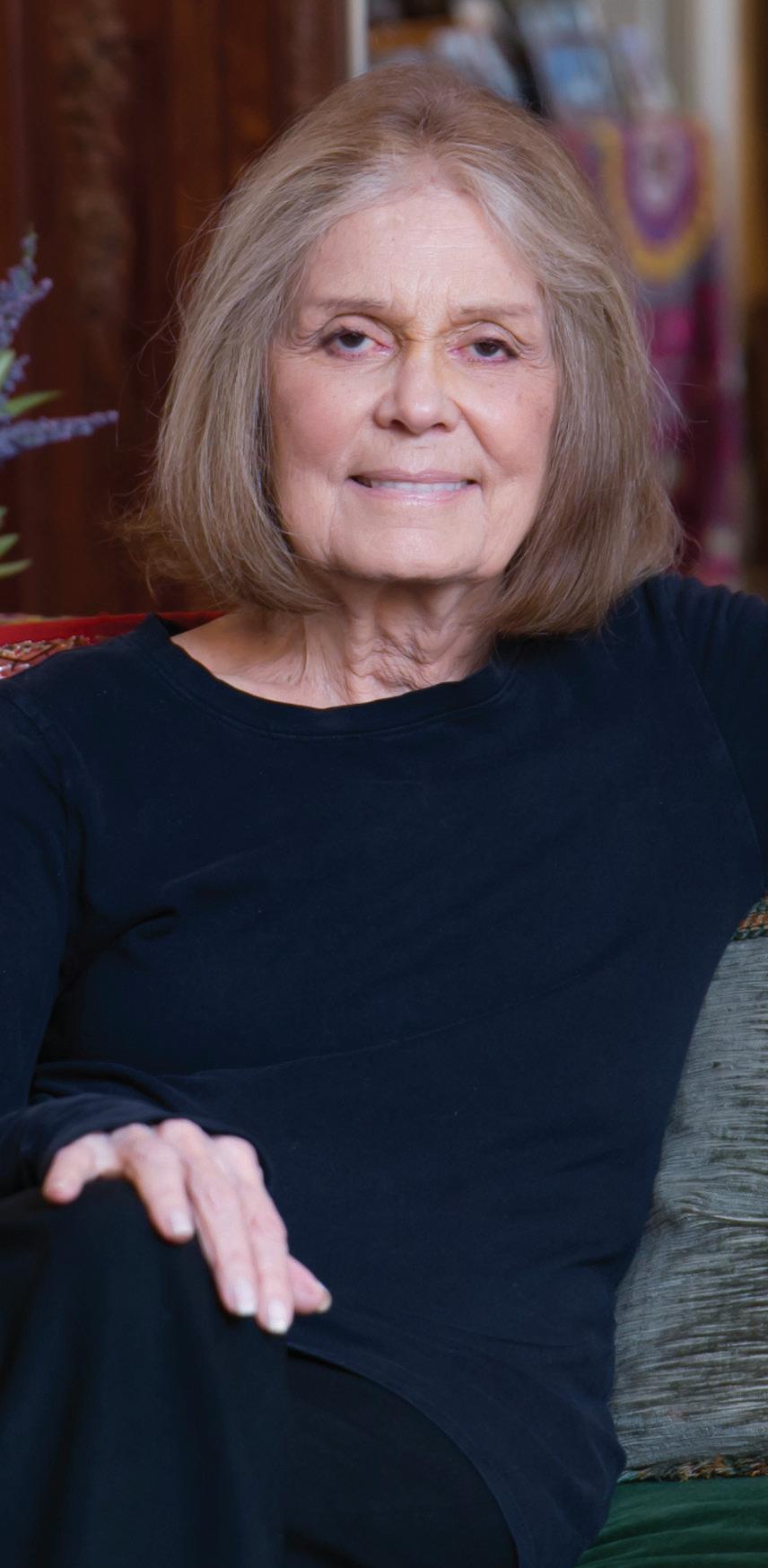
Photo by Katie Lyman

SMITH INFO
Major: Government House: Cushing
Job Title: Writer, Activist, and Organizer
Location: New York, NY
Gloria Steinem is a writer, lecturer, political activist, and feminist organizer. She has spent decades traveling in the U.S. and other countries as an organizer and lecturer and is a frequent media spokeswoman on issues of equality. She is particularly interested in the shared origins of sex and race caste systems, gender roles, and child abuse as roots of violence, nonviolent confict resolution, the cultures of Indigenous peoples, and organizing across boundaries for peace and justice. In 2013, President Obama awarded her the Presidential Medal of Freedom, this country’s highest civilian honor. She has authored many books, including My Life on the Road, which was adapted into a feature length flm, The Glorias. She lives in New York City.
“I have to say what gives me hope is that there are original cultures where prostitution didn’t exist as far as anybody knows. Rape didn’t seem to—if you read the letters of Europeans who came here shortly after Columbus, they’re amazed that indigenous people didn’t rape, even their female prisoners. They were very shocked that they didn’t beat
Published in Vol. 12 No. 1 (Spring 2014)

their children. They thought that was really wrong. You have to beat the devil out of your children (laughs). But it is so clearly a function of inequality and the enshrining of a passive, dominant, violent, victims’ cult of masculinity, the cult of femininity, and so on. It makes me feel hopeful when I read and listen to my Native American friends, or letters from the past, that say, ‘Well what did Columbus call primitive? Equal women’; they sort of have to make a joke out of it in order to survive. But for 95% of human history we had a diferent idea, a cooperative, mutually pleasurable idea of sexuality” (186).






I am grateful to Meridians and Smith College for re-publishing this discussion of sex trafcking, an issue then and now, in the lives of mostly women in both India and the United States. There is a reason why this body invasion is still an allurable enterprise in both our countries, despite laws against it, and also why more now, the person being sold may be more likely to be punished than the person who is the buyer. I hope this will be the beginning of a discussion about the diferences of then and now, and the progress we hope for in the future.

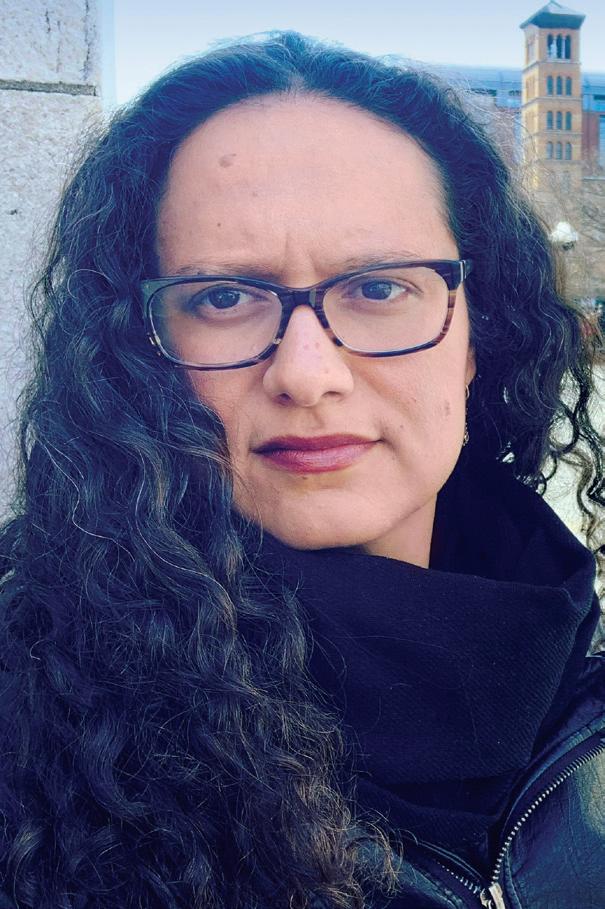

Major: English
House: Lawrence CURRENT INFO
Job Title:
PRODIG+ Postdoctoral Fellow and Faculty in Women‘s, Gender, and Sexuality Studies (WGSS)
Affiliation: Stony Brook University
Location: Stony Brook, NY
Ileana Jiménez is a leader in the global feminism-in-schools movement and creator of the hashtags #HSfeminism and #K12feminism. She is currently a postdoctoral fellow in the English department at Stony Brook University in New York. Her research focuses on Black and Latina feminisms, feminist and queer pedagogies, and digital feminist activism in the high school English classroom. An English teacher-activist and scholar, she taught women of color feminisms and queer literature classes at the high school level for over 25 years, and has also taught courses at Barnard College, New York University, and Teachers College, Columbia University. In 2011, she received a Fulbright to interview queer and trans high school students in Mexico City. She received her BA in English Literature at Smith College, an MA in English Literature at Middlebury College, and a PhD in English Education from Teachers College, Columbia University. She is @feministteacher on social media platforms.
“Ultimately, we remain interested and hopeful in what our students’ development as young Black feminists continually provides for us in terms of pedagogical refection as we attempt to grow as queer, feminist,
“Lessons

Published in Vol. 15 No. 1 (Spring 2016)
women of color educators committed to social justice and educational transformation in an increasingly diverse and social media-driven culture beset by political struggles and challenges. Our students’ transformations confrm for us the promise that teaching Black feminism in schools yields just as many rich opportunities for resistance and change as it does joy and love” (30).


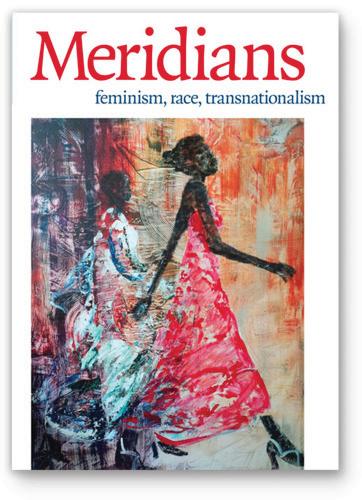
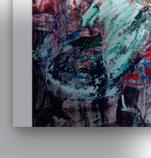


It was an honor to co-author “Lessons in Transgression: #BlackGirlsMatter and the Feminist Classroom” with Dr. Stephanie Troutman Robbins in 2016. During the previous year at NWSA’s annual conference (National Women’s Studies Association), Kaye Whitehead approached us to co-author this piece for a special issue on Black girl activism.
Stephanie and I saw this as our opportunity to highlight our work in both high school and college classrooms, as we strongly believe that teaching Black feminism to young people is important for developing critical consciousness and activist identities, especially for Black women and girls. We also wanted to model how a women’s and gender studies professor and a classroom teacher could collaborate on projects such as writing an article, creating curricula, and practicing pedagogy with activism.
Too often, teachers and scholars are isolated from each other, and we wanted to demonstrate that collaboration between feminist teachers and feminist academia is crucial and urgent work. Stephanie and I continue to collaborate on supporting critical feminist pedagogies in the high school classroom, and we are honored that scholars across the country include our article in their teacher education syllabi for graduate and undergraduate students, fostering the next generation of feminist educators and activists.

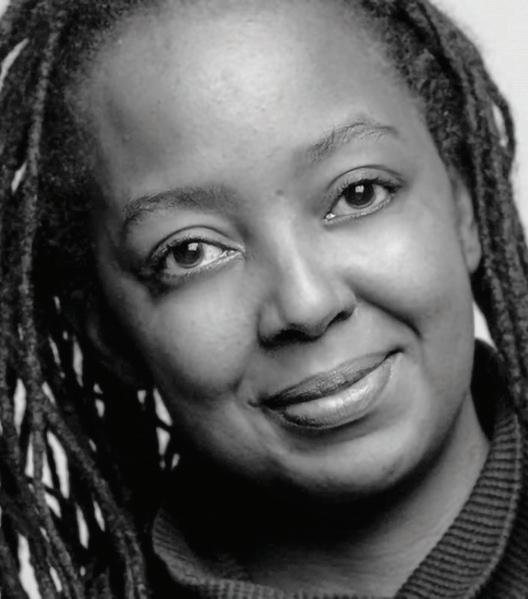
by Jerry Riley

Wambui Mwangi attended Loreto Convent Valley Road, Northfeld Mount Hermon School, Smith College (1990), McGill University, and earned a PhD in Political Theory and International Relations from the University of Pennsylvania. Wambui has taught at the University of Pennsylvania, Vassar College, and St. Lawrence University (Kenya Programme), developed a curriculum proposal for Aga Khan University, and guest lectured at Moi University, Nairobi University, Kenyatta University, and Daystar University. She is primarily interested in critical postcolonial theory, the work of gender, and the material economy of objects and social text as they interact in local and global economies. She is passionate about public art and founded the multiyear art project Koroga, which remains the largest single and publicly available collaboration between Kenyan poets and photographers ever produced as a digital archive of contemporary mixedmedia Kenyan art. Koroga has been exhibited in locations as diverse as the Netherlands, Australia, South Africa, Kenya, Canada, and the United States. Wambui is also a writer, photographer, painter, playwright, micro-landscape designer, and occasionally also performs oral literature. Her written work, photographs, paintings, and plays have been published, exhibited, or performed both in East Africa and globally in spaces that include the The Michael Joseph Centre, the Goethe
Major: Government
Minor: African & African American Studies
House: Chapin
CURRENT INFO
Job Title: Independent Writer & Artist
Location: Blacksburg, VA
Published in Vol. 17 No. 2 (Fall 2018)

Institute, the French Cultural Centre, The EastAfrican, Daily Nation (Kenya), Kwani?, Feminist Africa, Anglistica
AION, Comparative Studies in Society and History, Geopolitics, Meridians, New Internationalist, The New Inquiry, and Too Early for Birds.

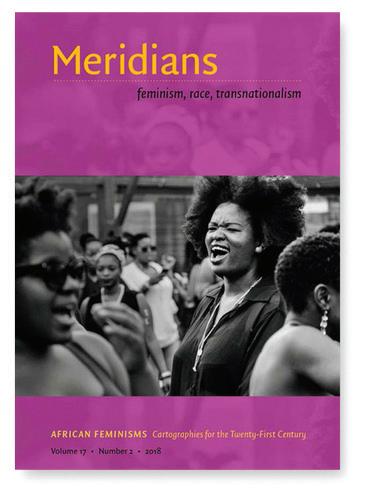
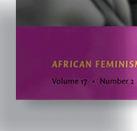


“Each of these images represents an African woman whom I have known and now mourn or miss because I have lost them in some way. I could not photograph them. They include my mother, my grandmother, my cousin, my friend, and even a younger version of myself. Some died, some moved away, some simply grew and changed. Yet, absence is a form of presence and an active shaping of the now: in memory, in mourning, and in melancholia. Presence is similarly an absence from elsewhere or else-when. Memories gather and matter by gathering meaning and matter. Sticky objects persist and follow and collect in human lives” (331).
The editorial board at Meridians is so superb under the guidance and leadership of Professor Ginetta Candelario that it is a deeply-ingrained habit in me to submit whatever kind or genre of work Meridians requests from me, usually without so much as asking why. In addition, Meridians is easily amongst the top three published sources I consider essential reading for my own continuing intellectual development because it is a publication that reminds me repeatedly of the value of a questioning mind and of a diverse and complex praxis. I particularly appreciate Meridians’ capacity to value, as intellectual production, not only the highest quality of academic writing, but also excellence in poetry and in various forms of visual art. The inclusivity and intelligence of this holistic transnationally adaptive approach not only enhances the international reputation of Meridians, but also exponentially enriches the theoretical and analytical perspectives of all of its readers, including myself.
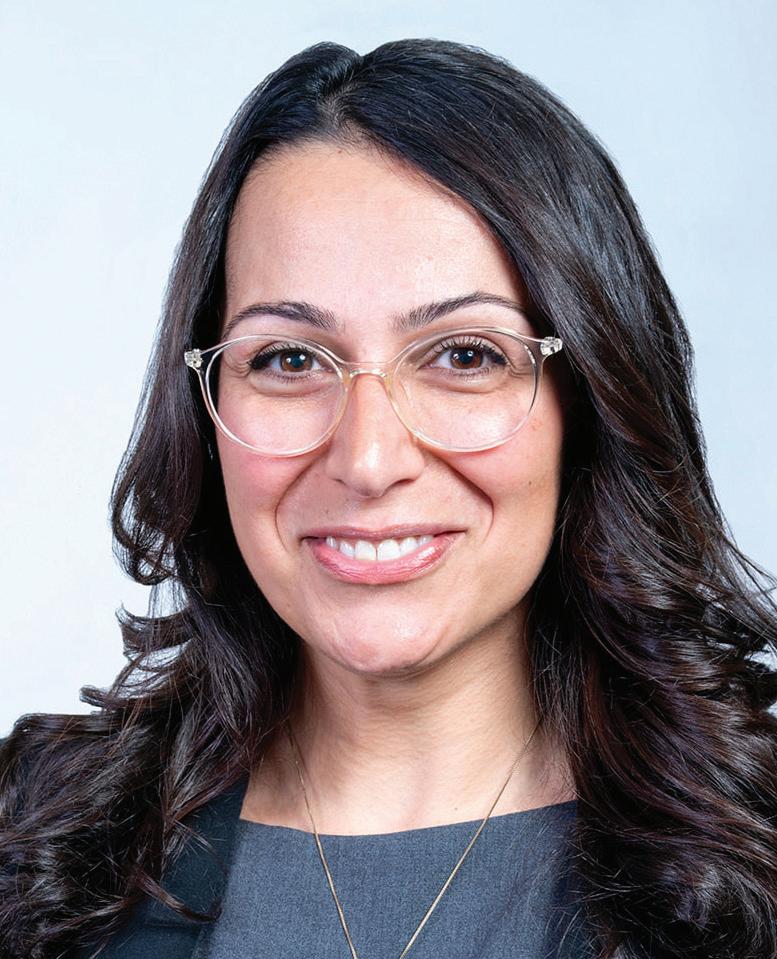

Major:
Sociology
House: Emerson
Job Title:
Canada Research Chair in Race, Ethnicity, Migration, and Identity
Affiliation: University of British Columbia Location: Vancouver, Canada
Neda Maghbouleh is a tenured Associate Professor of Sociology and Canada Research Chair in Race, Ethnicity, Migration, and Identity at the University of British Columbia. Her research examines the lived experiences of Middle Eastern and North African (MENA) communities in North America, and she advises organizations like the U.S. Census Bureau and the American Medical Association on racial classifcation. Her 2017 book, The Limits of Whiteness: Iranian Americans and the Everyday Politics of Race (Stanford University Press), originated as an Honors Thesis at Smith College and received awards from the Association of American Publishers and the American Sociological Association. She co-won ASA’s 2022 Oliver Cromwell Cox Prize for her article in the American Journal of Sociology. From 2018–2024, she led the RISE Team, a study on Syrian refugee resettlement in Toronto, with its frst publication in Meridians. Her work has appeared in NPR, The New Yorker, The Washington Post, and The Los Angeles Times.
“By critically refecting on our identities as women academics based in Canada, we had to acknowledge that despite being multilingual and from diferent racialized, national, and religious backgrounds, and despite our professional
Published in Vol. 18 No. 2 (Fall 2019)

training and credentials, the insights and skills we could bring to this scholarly endeavor were lacking in signifcant ways. [...] Crucially, we lacked cultural understandings that limited our ability to productively engage and interpret our interlocutors’ narratives. And in a broader climate defned by geopolitical violence against Muslim women and communities, our project risked reproducing uncritical, homogenizing, and Orientalist ideas about gender and power, particularly in the context of mothers’ forced migration and resettlement. We understood that we needed to seek partnership and guidance from others with diferent sightlines and knowledge” (487-8).

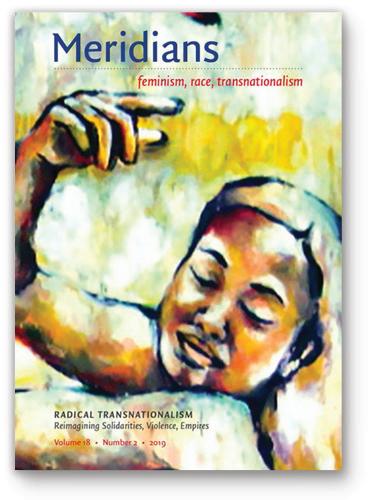
See more at nedamaghbouleh.com
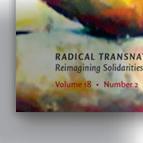


The publication of “Listening in Arabic: Feminist Research with Syrian Refugee Mothers” in Meridians: feminism, race, transnationalism is meaningful because of the journal’s long-standing commitment to centering the voices and experiences of women of color across global contexts. It is even more personal because of the visionary leadership of Ginetta E.B. Candelario, whose editorship has shaped Meridians into a critical space for feminist, anti-racist, and transnational scholarship. Ginetta’s infuence on my intellectual trajectory traces back to my undergraduate years at Smith College, where she co-advised my honors thesis alongside Jennifer Guglielmo. That early mentorship introduced me to feminist epistemologies and deeply informed the methodological commitments that animate my work today. To have my frst publication from the RISE Team (Refugee Integration, Stress, and Equity) appear in a journal she leads is both a fullcircle moment and a profound honor.

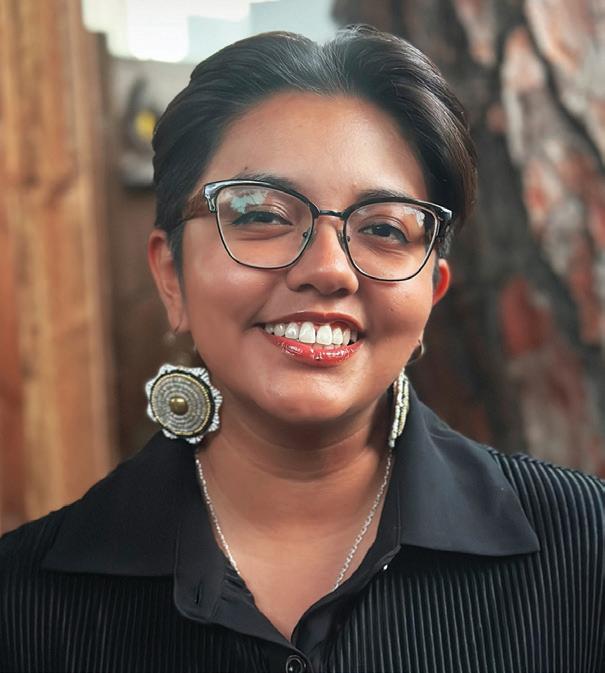

Major:
Latin American Studies and History
House: Comstock
Job Title:
Program Coordinator, Lionel Cantú Queer Resource Center
Affiliation: University of California Santa Cruz
Location: Santa Cruz, CA
des velázquez is a student afairs practitioner-scholar whose work, research, and advocacy centers trans and queer (TQ) people in higher education, with an emphasis on the thriving and worldmaking of TQ folks who are Black, Indigenous, and people of color. He holds a BA in Latin American Studies & History from Smith College and an MA in Higher Education from the University of Michigan-Ann Arbor. des recently co-authored a book chapter in Perspectives on Transforming Higher Education and the LGBTQIA Student Experience (2024), where he explores the experiences of QTBIPOC students and their perceptions of U-M’s campus queer center. He is currently the Program Coordinator at UC Santa Cruz’s Lionel Cantú Queer Resource Center. des is also an Executive Board Member of the Consortium of Higher Education LGBT Resource Professionals and serves on the Graduate Students & New Professionals Editorial Board for ACPA’s publication About Campus.
“In the spring of 1981, public opinion polls revealed that a vast majority of North Americans overwhelmingly opposed the Reagan administration’s military response to revolutionary activity in Central America (LaFeber 1984: 4). This came mere months after Ronald Reagan had run as a presidential candidate on a platform that cautioned against a Marxist Sandinista takeover of Nicaragua, which
“Genealogies of Transnational Activism: The Somos Hermanas Project in Central America”
Published in Vol. 18 No. 2 (Fall 2019)

seemingly threatened neighboring El Salvador, Guatemala, and Honduras (LaFeber 1984: 1).
In response to the increasing levels of violence by U.S. military–funded death squads, a multitude of antiwar organizations and collectives emerged throughout the United States. Many of these groups organized solidarity trips to the Central American isthmus. One of these included the delegation’s trip Somos Hermanas (We Are Sisters), which formed out of the preexisting Alliance Against Women’s Oppression as a solidarity project” (394).


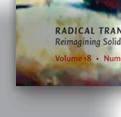


My experience interning at Meridians during my senior year at Smith was undoubtedly one of the most memorable and transformative, mainly because it unearthed my love for research and writing. When I was invited to write the introduction for archival materials from the Somos Hermanas project, I remember feeling surprised and uncertain. I had no experience engaging with archival material or writing for an academic publication, but I received enthusiastic support from Ginetta, Leslie, and my fellow interns. They built up my confdence and guided me through the entire writing process with great care and mentorship. Visiting the Sophia Smith Collection and learning about the publication process instilled an even more profound respect and excitement for conducting research. Furthermore, this experience taught me my responsibility to steward stories of liberation, justice, and community. While my professional and academic trajectory shifted from humanities to social sciences, my time at Meridians laid the foundation for the scholar I am today. This publication transformed my relationship with history in a very tangible and grounding way, as it became a point from which I started growing into my identity as a researcher. I am eager to continue writing and researching with and for queer and trans folks in higher education. I am forever grateful to Meridians for showing me I had a place in this kind of work.
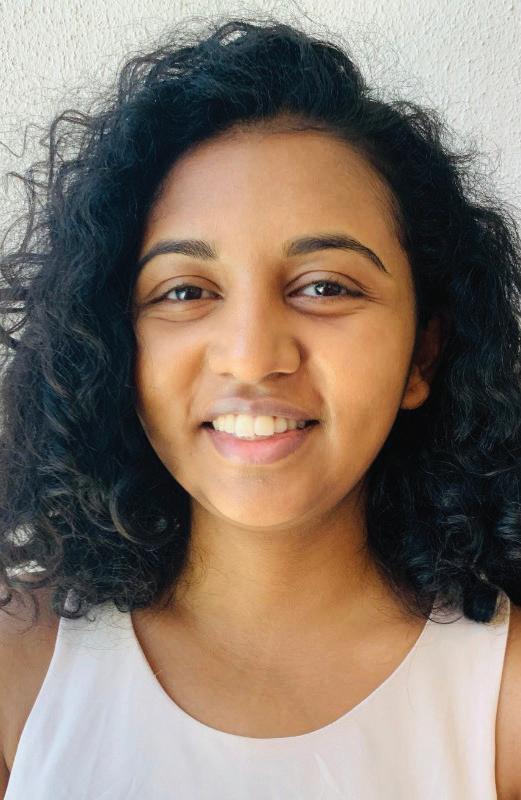

Major: Sociology
Minor: Economics House: Morrow
Job Title: Marketing Consultant
Location: Austin, TX
After graduating from Smith College and navigating the pandemic whirlwind, Mandira is now settled in the sphere of social impact and innovation. From high growth startups to a stint in academic publishing, her work refects her ever-growing interests and dedication to driving positive social change. Currently, she is exploring the next step in her journey in these crazy times. She is planning her own community events to help startup builders from diverse backgrounds and has plans to establish a nonproft down the line. Aside from the ofce emails and spreadsheets, the urge of creative energy still calls to her. If you want to see her recent work, check out her website, thoughtfulbrowngirl.com, or her sexual health podcast, Flowering Time, on Spotify.
“The Pan Pacifc and Southeast Asia Women’s Association (PPSEAWA) was established in 1928, when it held its frst conference. PPSEAWA’s mission is to foster friendship and collaboration among women from the Pacifc and Southeast Asia and women in the United States (PPSEAWA, n.d.). The founders of this organization sought to improve the social, economic,
“Introduction
Published in Vol. 18 No. 2 (Fall 2019)

I remember being in the Smith College Libraries— Neilson was sadly still under construction, so I have no memory of where I was.



See more at thoughtfulbrowngirl.com and cultural conditions of their respective nations through collaboration with the United States and the United Nations” (282).
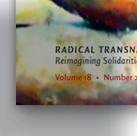


I was excited to see Asian representation in the issue’s archival piece. A discussion that took place in the U.S. Asians in America? Sounds familiar to MY ENTIRE LIFE. That only scratched the surface of what I’d fnd in these pages. This was a discussion among highly accomplished and educated women in the 1950s (an interesting note: in many of their bios, the husband and his job were mentioned, alongside the wife’s experience and accomplishments). These women are engaging in a serious discourse about the state of the world with the aim of improving social welfare. The details—from the setting of the meeting to the attendees to the discourse—provide incredible insights into transnational women’s history.
As for the writing process and publishing of the article, I was excited and nervous. It was my frst published piece and I wanted to make sure there were no mistakes. Being published in Meridians and working there as an intern truly built my confdence as a writer and a creator. In that same year, I won the S. Mona Ghosh Sinha Prize for a paper I wrote, which built my confdence. From the day I was accepted as a Meridians Fellow until now, I have been grateful for the experience.

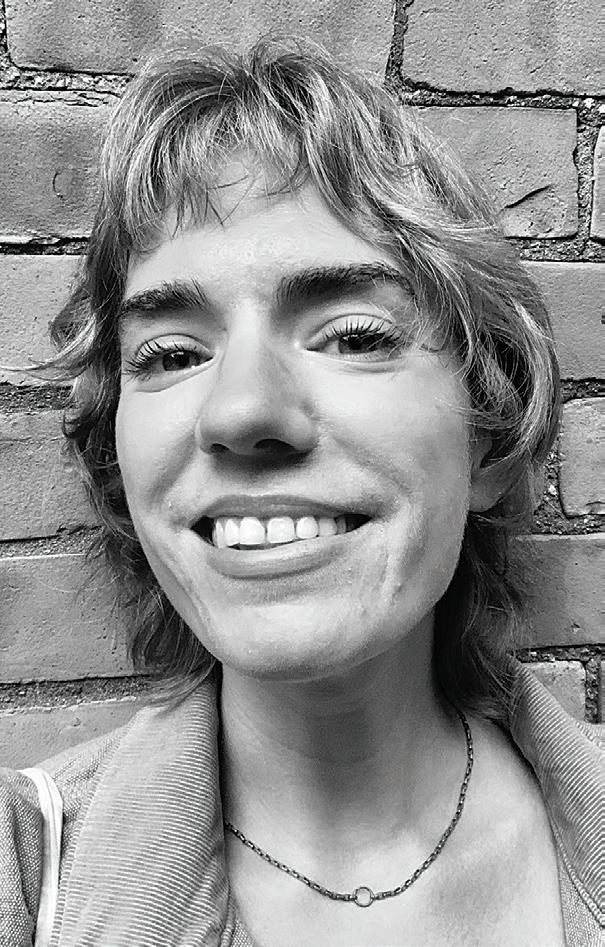

Major: Sociology
Minor: Sociology
House: Tyler
CURRENT INFO
Job Title: Policy Analyst
Affiliation: Public Health Law Center
Location: St. Paul, MN
Emma Schubert is a Policy Analyst at the Public Health Law Center, a nonproft legal technical assistance center that partners with Tribal, federal, and state government ofcials, researchers, and community advocates to develop laws and policies that advance health equity and community well-being. The Public Health Law Center believes that everyone deserves to be healthy. Emma brings a deep commitment to racial, gender, and reproductive justice to their life and work. They have a strong background in the abortion care and reproductive health and justice movements, where they witnessed the efects of hostile policy and inadequate funding on service provision, most afecting those already on the margins of access. They strive to use their experience to propel intentional, actionable, and values-based change. Emma received their Master of Public Policy from the University of Minnesota Humphrey School of Public Afairs, and their bachelor’s degree in Sociology from Smith College.
“Lebanese independence in 1943 and the creation of an independent state ushered in a period of
Published in Vol. 19 No. 1 (Spring 2020)

transformation for Lebanon. Women’s rights activists viewed independence as a perfect opportunity to shift their work away from education, charity, and a maternalist agenda, toward formal political participation, long considered a prerogative of men” (203).
“In the 1950s, [the Lebanese Council of Women] members traveled throughout the country and region of West Asia and North Africa attending conferences and meeting with heads of state and community leaders to build solidarity among women. They used formal channels, the press, public education, and direct action to advocate for the rights of women. After a decade of sustained and united campaigning, on February 18, 1953, they succeeded in pressuring the government to grant all Lebanese women voting rights” (204).


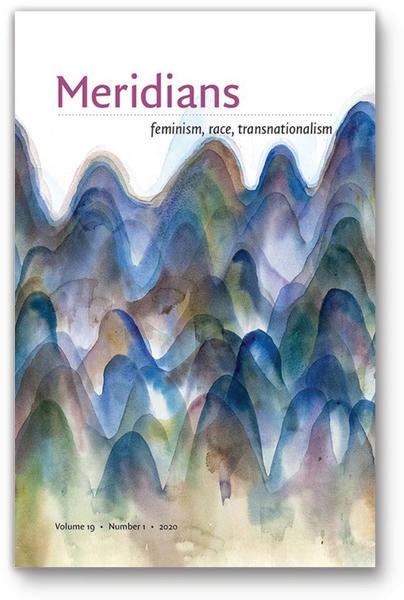



My contribution to the journal details the complex colonial, political, and economic, and social dynamics that Lebanese feminist activists navigated in pursuit of their liberatory agendas. These are the lessons we must return to as we work to make change in our own political climate today. As the Lebanese Women’s Movement teaches us, our work must be intergenerational and intersectional, built upon the knowledge of those that have come before.
My time as a Quigley Research Fellow at Meridians taught me that knowledge sharing, coalition building, and storytelling are praxis for our values. I am forever grateful for this lesson.
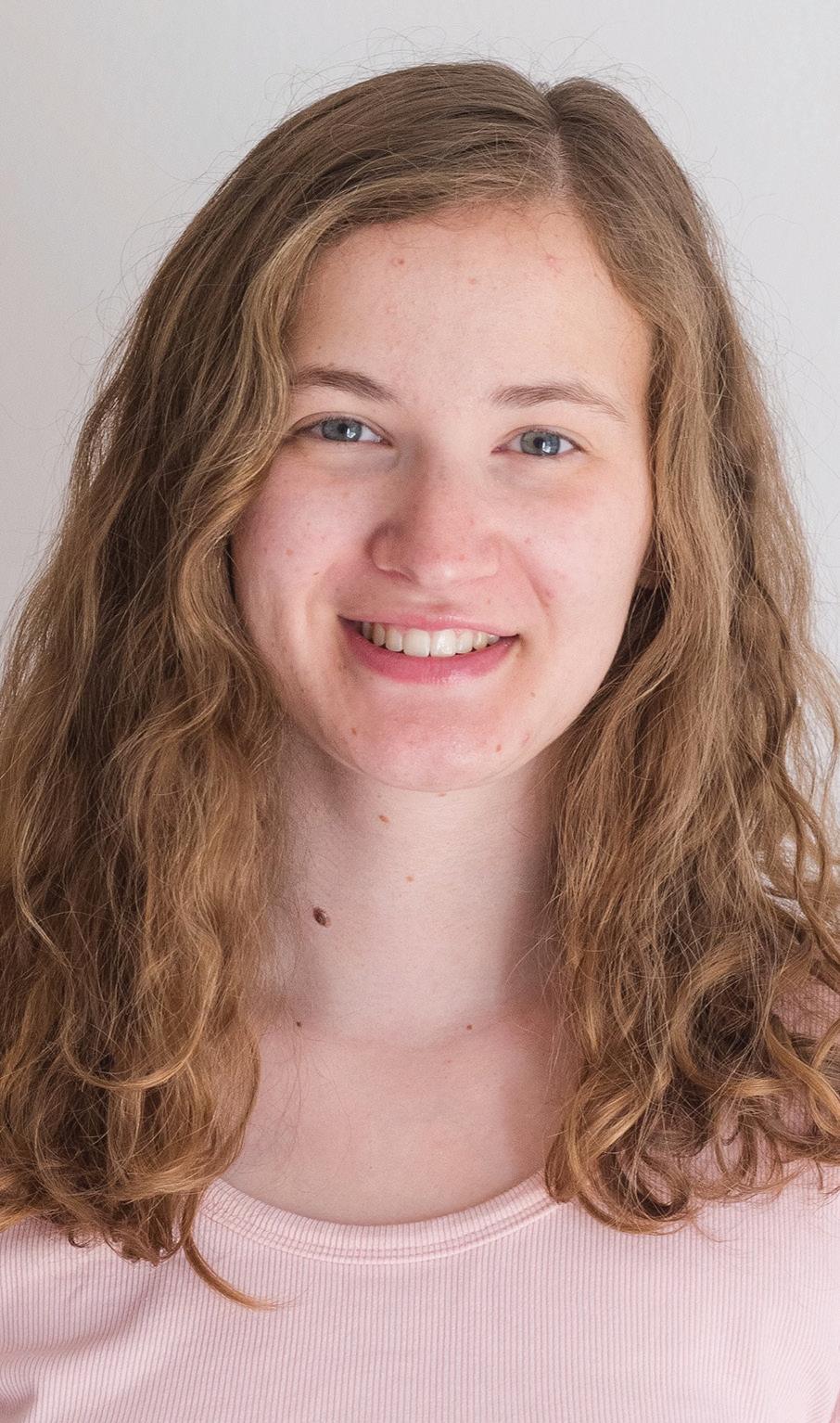

Callie Swaim-Fox moved to Durham, North Carolina, after graduating from Smith College and worked for the Pauli Murray Center for History and Social Justice, leading their interfaith programming. She then taught English in Jerez de la Frontera, Spain, and is now pursuing her Masters of Divinity at Yale Divinity School. She hopes to become a chaplain.
Major: History House: Emerson
CURRENT INFO
Job Title: Graduate Student
Affiliation:
Yale Divinity School
Location: New Haven, CT
“[Rochmuljati] Wirjohatmodjo’s celebration of Kartini—ostensibly for the ‘Community of Indonesian Women in New York’—ofers a window into the larger implications of celebrating Kartini Day and Kartini’s shifting legacy throughout Indonesian transnational history. The use of Kartini as a model in Indonesian history by three successive regimes— frst the Dutch Colonial regime, then the Old Order of Sukarno, and eventually Suharto’s New Order— illustrates how Kartini’s ideas and writing were interpreted according to the agendas of those in power. Wirjohatmodjo’s speech in 1956 exemplifes that pattern” (136).
“Though a small wave of Indonesian immigrants came to the United States in the 1950s, it was not
“Kartini Day”
Published in Vol. 19 No. 1 (Spring 2020)

until after the 1965 Immigration and Nationality Act removed restrictions on Asian immigration that a large group of Indonesians would settle in the United States (Cunningham 2008: 93). Thus, Wirjohatmodjo’s speech can be seen in this vein not only as working to unite the small Indonesian American community but to inform the broader U.S. public about the work of the new Indonesian government. Records of Kartini Day celebrations in the United States appear in local newspapers as early as 1950, and almost all of them were led by Indonesian women diplomats who invited U.S. women to teas or dances to celebrate Kartini and Indonesian culture (Indonesian Tea Honors Feminist 1950; McNair 1951)” (136).



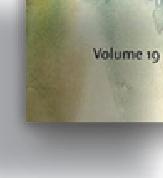


My work with Meridians allowed me to dive into the archives at the Sophia Smith Collection and bring to the forefront the words and works of women of color from generations past. It was an honor to watch the ways that the Meridians staf puts such care and efort into their mission. Meridians connected me with scholars around the world working to shape scholarship around the lives and work of women of color. As I continue my work in academia, Meridians continues to stand out in my mind as an example of what world-shifting scholarship can be.
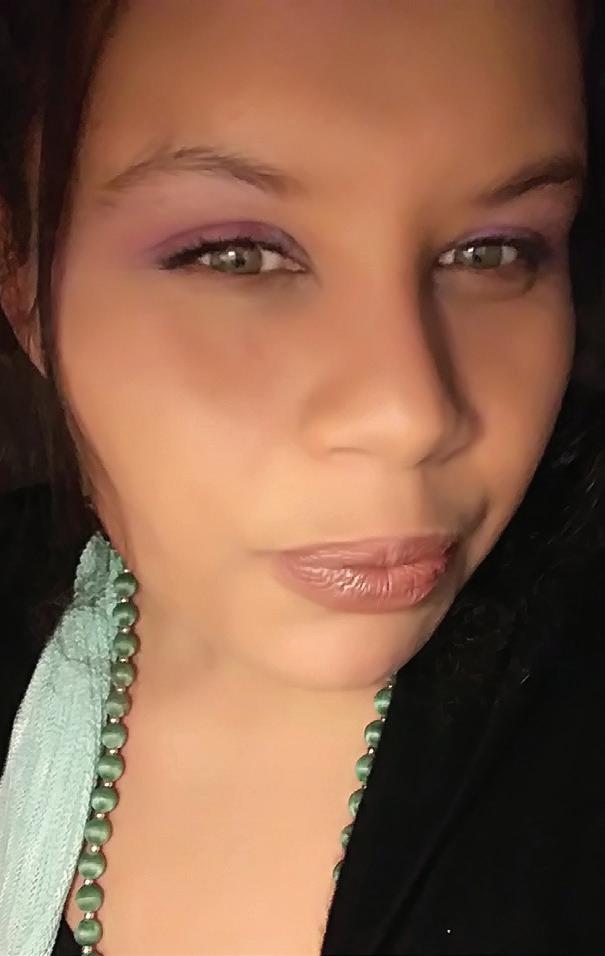

Major: American History
House: Conway
CURRENT INFO
Job Title: Lead Special
Education Teacher
Affiliation: May Institute
Location: West Springfeld, MA
Sheilena Downey is a Lead Special Education teacher working with high school–age students with disabilities. She is currently completing her master’s degree in Severe Disabilities Education. A frst-generation college graduate, she earned her BA from Smith College in 2020. Originally from Brockton, Massachusetts, she now resides in West Springfeld, Massachusetts, with her daughter. Sheilena has a deep passion for history and its role in shaping the future. She is a lifelong advocate for marginalized communities and those who cannot advocate for themselves.
“The International Council of Women of the Darker Races of the World (ICWDR) was founded in 1922 by prominent members of the National Association of Colored Women (NACW). This exclusive council, initially comprising eighteen well-educated and highly respected middle-class African American women, was actively engaged in a variety of political agendas and social reform eforts locally and nationally” (271).
Writing my essay on the International Council of Women of the Darker
“Precursor to Women of Color Feminism: The International Council of Women of the Darker Races of the World and Their Internationalist Orientation”
Published in Vol. 19 No. 2 (Fall 2020)

Races of the World was both a deeply rewarding and eye-opening experience.
Researching this organization allowed me to uncover the critical yet often overlooked contributions of early 20thcentury women of color global feminist movements. It was both challenging and inspiring to piece together the council’s internationalist vision, demonstrating how these women navigated racial and gender barriers while forging transnational solidarities. Writing this piece pushed me to think beyond dominant feminist narratives and explore the intersection of race, gender, and internationalism in new ways.


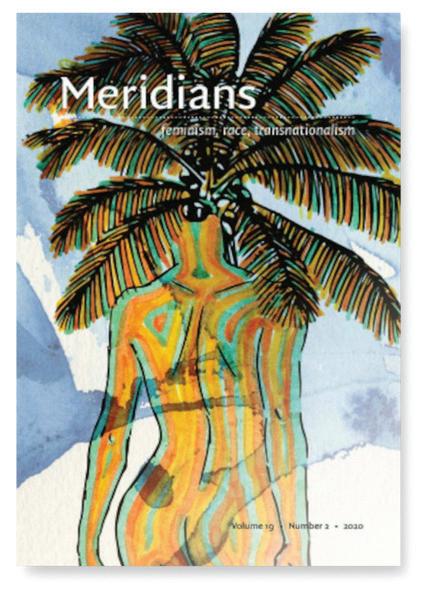



The publication of my essay in Meridians was incredibly meaningful for me as both a scholar and an advocate for historically marginalized voices. Seeing my work included in a journal dedicated to feminist scholarship by and about women of color afrmed the importance of recovering these histories and making them accessible to a wider audience. It also encouraged me to continue my research on the global dimensions of Black feminist thought, inspiring further work on transnational activism. More personally, the experience reinforced my commitment to amplifying the voices of those who have been left out of mainstream historical narratives. The support and engagement from the Meridians community have been invaluable, and I am honored to contribute to a publication that continues to center and celebrate the intellectual and activist legacies of women of color.
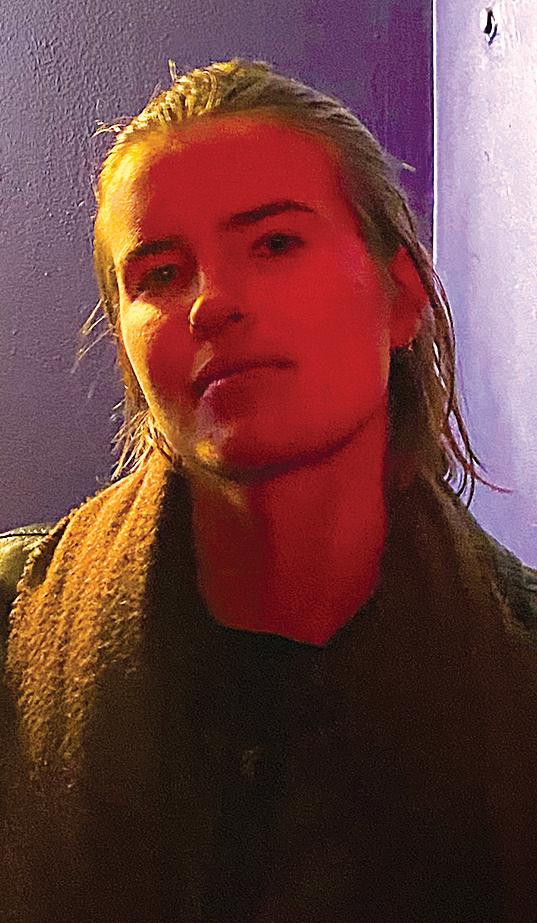

Cece works as a freelance writer and educator in Valencia, Spain. While she waits to hear back from graduate schools in creative nonfction, she spends her days reading, writing her novel, traveling, and connecting with the natural world. Her corner of the written world explores intercultural, multilingual, and speculative nonfction that embraces folklore, imagination, and mystery.
Major:
English, Creative
Writing
Minor: Spanish
House: Wilson
CURRENT INFO
Job Title:
Freelance Writer and Educator
Location: Valencia, Spain
“El Wallmapu is a region spanning the base of the Southern Hemisphere, extending through parts of Chile and Argentina long before the frst winkas invented their territorial delimitations.
El Wallmapu is not a territory, explicitly; its aboriginal people now steward only 6 percent of its terrain. It holds the history of conquest, and the modernity of its material exploitation. Private sectors want to convert its mountains to mines of gold and silver, its biodiversity to monoculture forests. How can we conceptualize of a place that once was? That has within it buried an ancient knowledge and collective memory?
Amancay is trying to remember” (17).
Published in Vol. 23 No. 1 (Spring 2024)

In writing “Mes del viento” for my undergraduate thesis, I submerged myself in the lore and power of Patagonia’s land, as well as its ancestral people, the Mapuche lof Kinixikew. The process was one of constant humility, questioning, and expansiveness, as I had to look beyond everything I thought I knew about knowledge and its productions. I knew I wanted Amancay Quintriqueo to be a cowriter in this piece, rather than a “subject” in the classic nonfction tradition. My time was spent with her, my mentor, Flor, or in the mountains and wilderness of Patagonia, feeling it as if it were an alive thing: I recognized that only once I could see my surroundings as the spirits in the stories I was being told, would I then be able to properly honor this story.


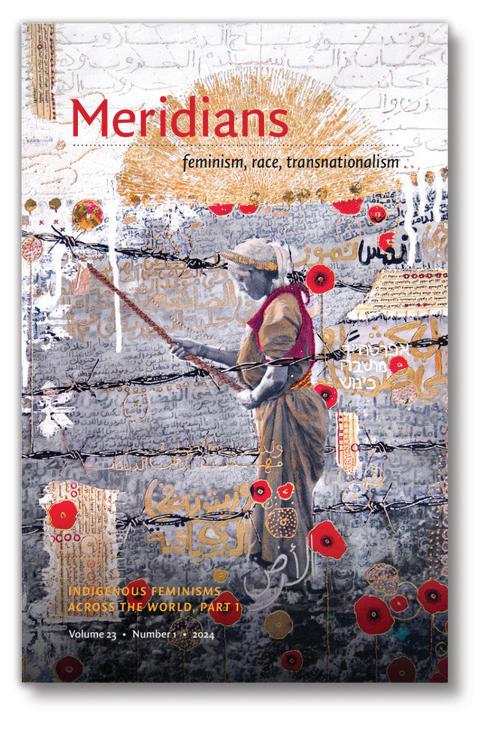
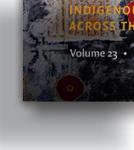
In being honored as the Elizabeth Alexander Award recipient of 2023, I discovered, as a novice and aspiring writer, that there was a community and audience for the kinds of pieces I envisioned myself writing. All of the complications that made this story political, personal, multifaceted, and even at times contradictory, is what gave the story power. Meridians’ recognition has given me the courage to pursue the stories I am writing today.

See more at cecerotheagle.substack.com
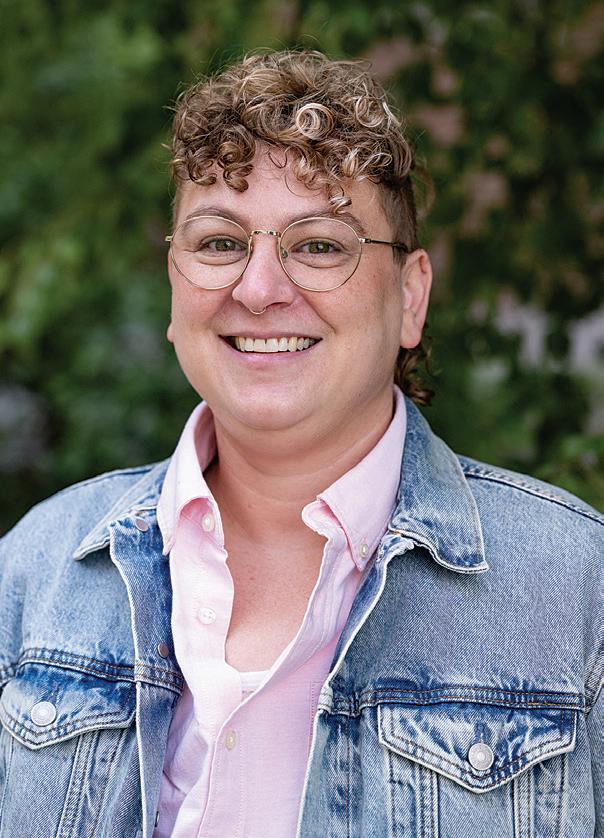

Major: American Studies
Houses: Hubbard and Sessions Annex
CURRENT INFO
Job Title: Assistant Professor in the Department of American Culture, Department of Film, Television, and Media
Affiliation: University of Michigan
Location: Ann Arbor, MI
Umayyah Cable is an Assistant Professor in the departments of American Culture and Film, Television, & Media, and a core faculty member in the Arab and Muslim American Studies program at the University of Michigan, Ann Arbor. Their frst book, Mainstreaming Palestine: Cinematic Activism and Solidarity Politics in the United States, will be published by the University of Minnesota Press in fall 2025. Their research has been supported through fellowships at Northwestern University and Harvard University, and their articles have been published in Framework: The Journal of Cinema and Media, GLQ: A Journal of Lesbian and Gay Studies, The Journal of Palestine Studies, and Meridians.
“Jadallah had already been active in the Bay Area’s Arab American leftist movement, particularly around the issue of Palestine. But it was her desire to do more specifc Palestine-related outreach with the queer community which prompted her dual coming out. Forging queer-Palestinian solidarities ‘was work I wanted to do, and I knew if there were signs posted in San Francisco that Arabs my mom knew were going to see it. I felt like I had to tell my mom before someone else told
Published in Vol. 23 No. 2 (Fall 2024)

her. That’s what motivated me to come out to her, it was political work, actually’ (Cable interview with Jadallah, July 17, 2017). In coming out as Palestinian to the lesbian community, Jadallah aimed to leverage her lesbian identity in order to advance Palestine solidarity politics within the lesbian community. Her plans to participate in the LISPP forum and the visibility of the fyers throughout San Francisco is in turn what prompted her to come out as lesbian to her family. Her dual outness here was strategic, but not without ambivalence” (476-7).


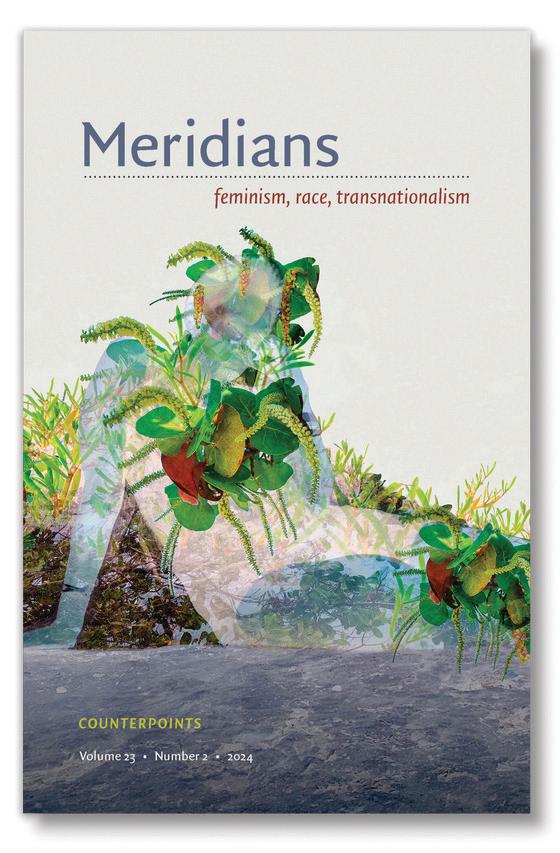
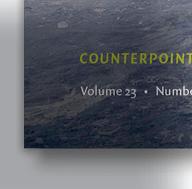


Growing up queer and Palestinian in the U.S. in the 1990s was a lonesome experience. Working on this essay was like reaching across time. I wanted this essay to reassure my younger self, to honor and transfer knowledge from a queer Palestinian elder, and to speak to queer Palestinian presents and futures. In the time between submitting this manuscript for initial review and receiving the readers’ reports, my estranged elder brother died suddenly. In the wake of his death, several pieces of the puzzle that was his life fell into place. This article was revised in the shadow of his passing, and it was through that grief that certain afective aspects of archiving, memorialization, and radical history came to the forefront. In this way, writing this essay was not simply about reaching across time or generations. It was also about reaching across planes of existence, or “the threshold of death,” as I refer to it in the article.

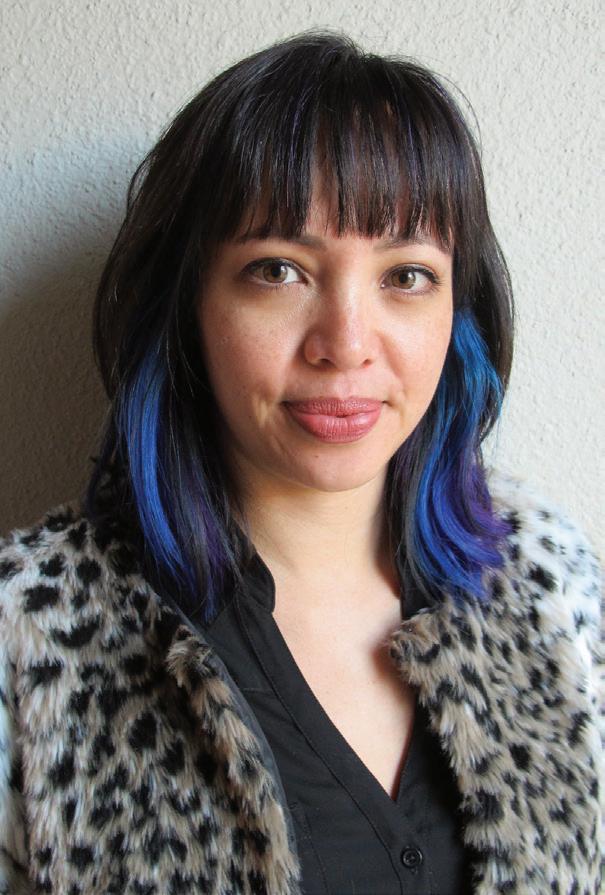

Major: Anthropology and Sociology
Minor: Cultural Dance
Houses: Lamont and Park
CURRENT INFO
Job Title: Health Educator
Affiliation: Gateway High School
Location: San Francisco, CA
Caroline M. Mar is the greatgranddaughter of a railroad laborer and the author of Water Guest, the Editors’ Selection for the 2024 Wisconsin Poetry Series. She is the author of Special Education (Texas Review Press), which won the 2019 X. J. Kennedy Prize, and the chapbook Dream of the Lake (Bull City Press). Carrie is a graduate of the MFA Program for Writers at Warren Wilson College, and a member of Rabble Collective. She also serves on the board of Friends of Writers. She is a longtime ninth grade health educator in her hometown of San Francisco, and lives in Oakland, California. She has been granted residencies at Hedgebrook, Ragdale, and Storyknife, among others. You can fnd her online at carolinemar.com.
It was a joy to have two poems selected for publication in Meridians. I’ve known about the journal for decades, of course. So when I was looking for somewhere to house these poems it made a lot of sense to submit to Meridians not only because I’m a Smithie, but also because of the focus on transnationalism, history, race, and identity. The frst poem, “Catalog of Writings Left by Chinese Railroad Laborers of the CPRR,” has no words.
Published in Vol. 23 No. 2 (Fall 2024)

the not necessary, not needed, unrequired and unrequited missing of your voice, your knotty hand not near enough to mine, please pass the 清 蒸 魚, no need to worry, no need, please pass back into this kitchen, this house, this life that you left, don’t bother, don’t worry about it, we say, you said, I say to no one, I don’t need it, I’m not hungry, but I am always hungry, I do so need you, and so much more
10,000+ Chinese men came to build the railroads, and records show paper and ink being ordered for them in bulk, yet not a single scrap of primary source writing remains; I was writing into the vast silence of this library of loss. I had hoped Meridians would see and honor the space I was trying to hold in this poem, and in the second, shorter poem—a meditation on grief and missing my deceased grandmother. I am so honored to be part of Volume 23.
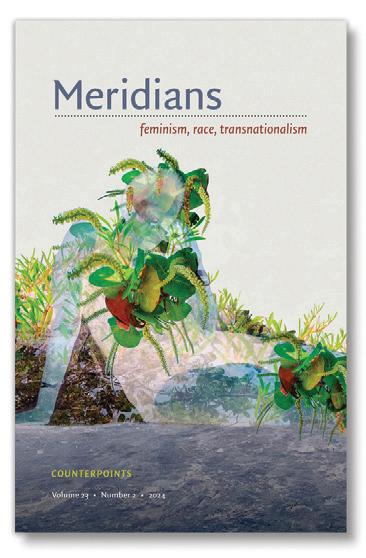
See more at carolinemar.com






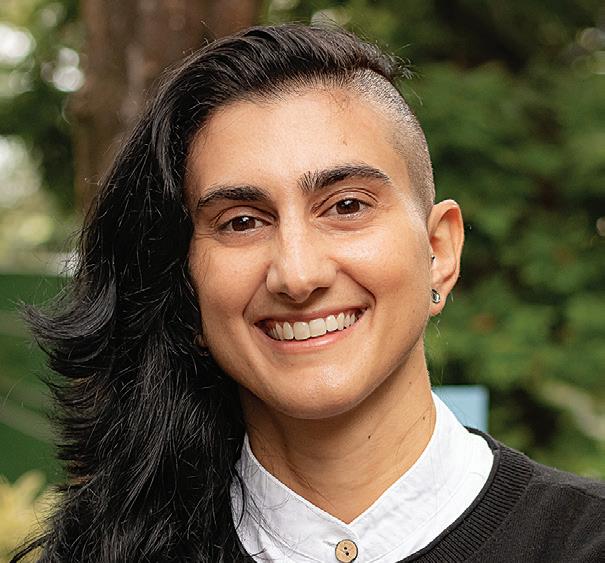
Photo by Ana T. Reis

Major: Philosophy
House: Jordan CURRENT INFO
Job Title:
Anna Julia Cooper Postdoctoral Fellow
Affiliation:
University of Wisconsin –Madison
Location: Madison, WI
I am an Assistant Professor of Sociology at the University of Wisconsin–Madison and a Faculty Afliate of the Center for Law, Society and Justice. My research focuses on diferent dimensions of legal and penal state power: their relationship to how societies are organized, the forms of social exclusion that characterize them, and the people and mechanisms that infuence their change over time. My current research examines public defenders who counsel poor people in Brazil’s penal courts to clarify the dynamics that shape legal aid professions in diferent contexts, including their relationship to inequality, racialized violence, and state transformation. In other work, I examine how carceral administration connects to dynamics of social confict and political legitimacy. My research has been published in venues such as the American Sociological Review and won multiple awards from the American Sociological Association. I earned my PhD and MA in Sociology at the University of California, Berkeley and my BA from Smith College.
“Since the inception of modern states, penal state power, practices and authorities have been integral to imposing diferent regimes of domination along racialized lines in Brazil and the United States (and far beyond)—from policing in both countries having their origins in slave patrolling, to penal state coercion consolidating and maintaining the racialized inequalities and exploitation that undergird capitalism and empire (Bruccatto 2014; Davis 2005; dos Santos et al. 2020; Willis 2022). Among the poor, who are
“The Policing & Carceral State in Brazil & the United States: Conceptualizing, Tracking & Resisting Anti-Black Violence”
Published in Vol. 24 No. 2 (Fall 2025)

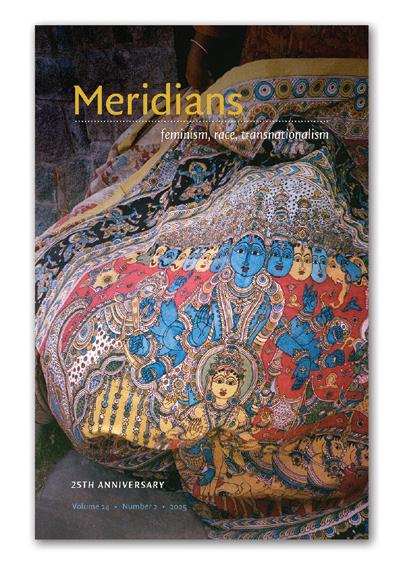
overwhelmingly the target of penal state power, Black people are disproportionately arrested, detained and killed by policing authorities (Vargas 2008; Franco 2019; Reis 2013). Since the late 20th century, transnational punitive drug control has been exemplary of how “innovations” in penal discourses, policies and technologies have legitimized both old and new forms of violence and terror in these countries’ contemporary democracies (Alexander 2010; Alves and Alves 2015; Kalunta-Crumpton 2015). Today, the Brazilian and U.S. penal states also confne two of the largest populations of incarcerated people world-wide (ranked frst and third, respectively) (World Prison Brief 2021). Both disproportionately confne Black communities and other ethnoracially marginalized peoples (Gilmore 2007; Akotirene 2020; Simes 2021). And yet, distinct penal histories have infuenced adoptions, adaptations and reforms in penal practices as well as the modes of resistance against them.”
This article is based on a panel dialogue focused on the racialized dimensions of state violence through policing and incarceration, a conversation that took place during the symposium on Anti-Black State Violence Across the Americas: Power and Struggle in Brazil and the United States, hosted by the University of California, Berkeley in 2019. I developed and co-directed this symposium, which was organized by an interdisciplinary group of graduate students during my time in graduate school at UC Berkeley. The event brought together 30 infuential Black movement scholars, activists, and scholar-activists on 11 panels (with a public audience of over 600 people). For the panel on the policing and carceral state I had the honor of moderating this conversation between Andreia Beatriz Silva dos Santos (co-founder of React or Be Killed based in Salvador, Brazil) and Cat Brooks (co-founder of the Anti Police-Terror Project based in Oakland, California)—my co-authors for this current publication in Meridians, which is an abridged transcription, translation, and commentary on the panel discussion.
Meridians: feminism, race, transnationalism
wants to thank all of the individuals and units from across the college who contributed to this commemorative project.

We are grateful to all the Smith alum authors, and to:
Kyla Butler ’25 Quigley Fellow, Meridians
Michael Byrne Communications Manager, College Relations
May Caroline Chan, Ph.D. Editorial Assistant, Meridians
Virginia Cornett ’27 STRIDE Fellow, Meridians
Rinal Dahhan ’27 Quigley Fellow, Meridians
Carolina Dellepiane AC ’20 Symposium Coordinator, Meridians
Kixie Denison Fieldman ’53 Fund
Smith College
Allyson Einbinder ’10
Administrative Manager, Meridians
Isabella Grijalva ’27 STRIDE Fellow, Meridians
Lil Knight ’94 Communications Editor, College Relations
Amy McDonald Director of Digital Strategy and Creative Services, College Relations
Project on Women and Social Change
Smith College
Study of Women, Gender, and Sexuality Program
Smith College
Xinyang Sun ’25
Quigley Fellow, Meridians
Linh Tran ’27
Quigley Fellow, Meridians
President Sarah Willie-LeBreton Smith College

